#some spoilers for the latter part of the game
Explore tagged Tumblr posts
Text
His life depends on you
The Thunder Dragon’s condition has deteriorated rapidly, and Link must hurry to save him.
drawing | AO3
Master Link, please hurry…Lanayru’s life is in your hands.
The chimes of Fi echo through Link’s mind as he rides his Loftwing through the sky, the fruit from the Tree of Life tucked safely into his magical pouch. He keeps his eyes on the yellow beam of light cutting through the sky, opening the path to Lanayru Desert.
Faster, Crimson. Faster.
The bird squawks as Link whistles, performing its spiral charge to propel the two forward, and Link’s head spins from flipping through the air. They need to get to the desert, and fast. Lanayru is weak, so weak…Link isn’t sure how much time the Thunder Dragon has left.
He must not fail. He must revive Lanayru. For if not…he doesn’t even dare to think about what would happen.
Finally they reach the yellow beam, the light nearly blinding Link’s eyes, and he throws himself off the Loftwing, spreading his arms and legs out as he freefalls through the cloud barrier.
Fi pops out of the sword and floats in front of him. Normally she would ask him where he desired to land, but this time Link’s mind fades to white as magic encircles him. She knows to take him to Lanayru Gorge; he has no other choice. Going the long way would take so much time, precious time that Lanayru may not have.
Seconds later, he finds himself floating over the grassy plain of the time-shifted gorge, and he quickly pulls out his Sailcloth for a smooth descent. As soon as his feet touch the ground, he looks ahead where the dragon resides…
Oh fuck. Oh Hylia.
Link’s heart nearly stops in his chest.
The mighty Thunder Dragon, who once had his head up with his arm resting on a small circular ledge, is now lying flat on his back, too weak to hold himself up any longer. His arm lies limp by the ledge, he's not moving, he's not moving-
SHIT SHIT SHIT.
“LANAYRU!!” Link shouts with all his might, letting the Sailcloth drop to the ground and making a mad dash across the gorge. No no no this can’t be happening this can’t be happening this can’t be-
The dragon still lies there, unresponsive, and from this distance Link can’t tell if he’s even breathing.
I was too late.
GOD DAMNIT, I was TOO LATE!
He had failed them all. He failed Lanayru, he failed to complete the Song of the Hero, now he just lost his last chance of finding the Triforce, and he won’t be able to defeat Demise and the wretched beast will kill Zelda, he’ll kill them all and-
Tears threaten to spill from Link’s eyes as he moves closer to the dragon.
“Lanayru…” he tries, nearly out of breath from the running.
…No response.
“LANAYRU?!?”
Wake up Lanayru please PLEASE wake up-
Now he can see a couple LD-301 robots, one of them standing by Lanayru’s arm, his back to Link. They don’t even seem to acknowledge the hero’s presence.
“Hey, Lanayru? Thunder Dragon, can you hear me?”
…Oh Hylia, Oh Zelda, I’m so sorry…I failed you, I did everything I could and it still wasn’t enough-
He sinks to his knees as Zelda’s beautiful face comes to mind…fast asleep in her crystallized slumber, and now she may never wake up. All because Link wasn’t fast enough to get this fucking piece of fruit to a fucking dragon-
“He’s still alive, voo-weep.”
Link slowly raises his head. “…Huh?”
The robot has turned to face him now, and he gestures to the dragon’s large belly. And now Link sees it, he sees the rise and fall of Lanayru’s chest he had failed to notice before in his panic, the dragon is breathing.
“Oh, thank Hylia…” Link chokes out, wiping the tears from his eyes. “Thank the Golden Three…”
Lanayru’s alive. Incredibly exhausted, and sick to the point of near-delirium…but alive nonetheless.
Link hadn’t been too late after all.
“Nggghhhh….mmph?” Lanayru groans, eyes fluttering open. His chest heaves and he hacks up a cough, the booming sound nearly hurting the small hero’s ears.
“I’m here, it’s me, Link! I have the fruit…you’re gonna be okay!”
“Wh…wha…?”
“Yeah, I’m gonna save you! Fucking Hylia, Lanayru, you scared the living shit out of me!”
Slowly, the dragon turns his head to meet Link’s eyes, and the hero reaches into his pouch, summoning the magic to hold the large, heavy piece of Life Fruit in his hands. He grunts from the effort, but manages a smile as he holds the fruit close, making sure nothing happens to it.
“Is-is that…the…” Lanayru wheezes, in between dry coughs. “You…brought that…f-for me?”
“Of course! I just need you to eat this, ok? You’ll feel so much better, I promise.”
Ever so slightly, a glimmer of hope shines in Lanayru’s bleary eyes. And Link lets out a sigh of relief. You did it…you really did it.
Once the dragon eats the fruit, he will be back to his energetic self, and the Song of the Hero will soon be complete.
Don’t worry Zelda, I’m coming.
#bailey writes#skyward sword link#lanayru the thunder dragon#some spoilers for the latter part of the game#tw swearing#(i mean…any of us would swear like a sailor in links position)#pls lmk if any other tw’s are necessary for my writing!#linktober 31#sky goes through the horrors
16 notes
·
View notes
Text
Let’s talk about the significance of how Stephanie Browns first ever appearance is tied directly to a TV broadcast about Batman, and how it perfectly explains why she's such a remarkable character.

Detective Comics #647
The full sentence the TV broadcaster says is “It’s not up to some masked vigilante to protect our citizens …. No matter how good his intentions…No matter how noble his cause”.
This scene asks us to compare the characters of Batman, who the statement is textually about, and Stephanie, who is viewing it and (presumably), being inspired by it. The panel itself seems to encourage use to try to apply these lines to Steph instead of Batman, framing the latter proclamation directly above her head, almost like a text box telling us this information about her. If we apply these lines to her, we can see an idea emerge.
There is this figure, who is not only not necessary, but unacceptable on the face of it, “…No matter how good [her] intentions...” / “…No matter how noble [her] cause…”
The first time we see Stephanie brown, she is being showcased alongside a condemnation, which is followed by her disregarding the message of this broadcast, and appearing for the very first time as Spoiler.
Dismissal and Stephanie ignoring this condemnation continues on to be one of the central facets of Stephanie’s character. In the same introduction arc we already see the dismissal/disregard dynamic established.
Batman and/or Robin tell her to Fuck Off, she chooses not to:

Detective #649
This pattern continues on for some time. She is dismissed by Batman
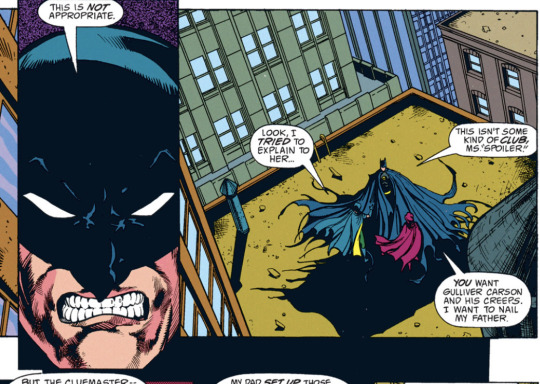
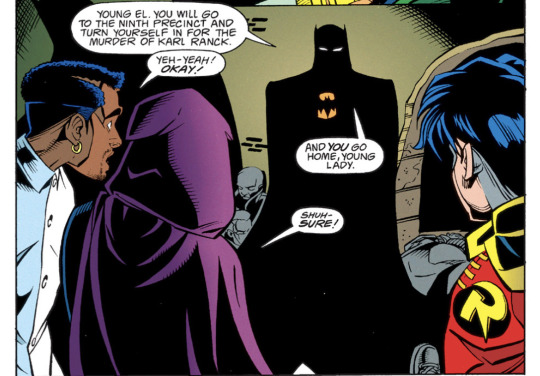
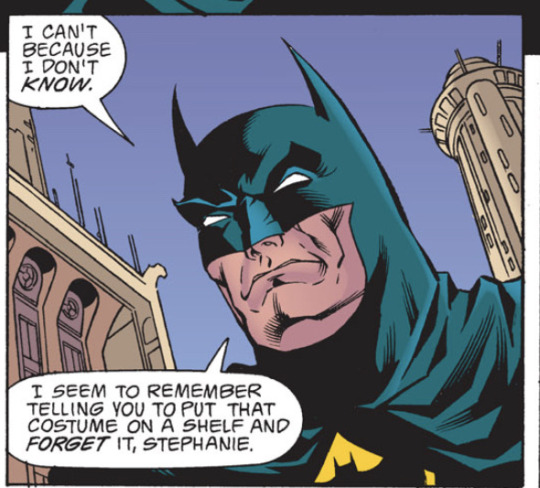
Robin #16, Robin #26, Robin #50 (1993)
And by Tim Drake/Robin:
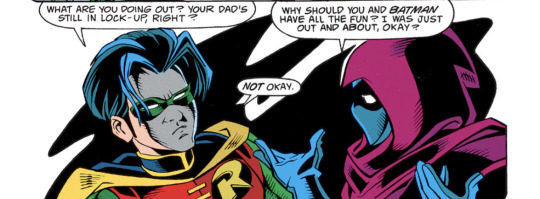
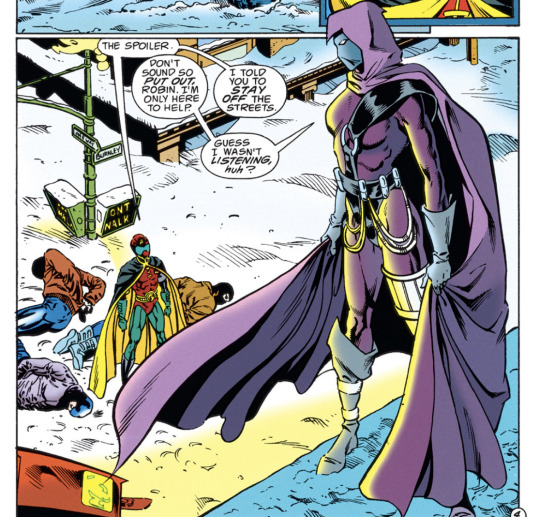

Robin #25, Robin #35, and Robin #26 (1993)
And by her own mother:
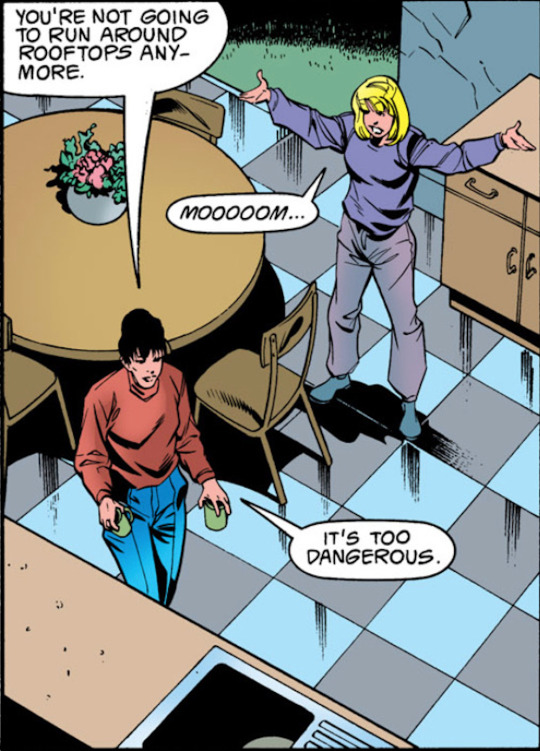
Robin #71 (1993)
When she finally becomes an official part of the team in 2001, there is a break in this pattern. But, as always, Stephanie is eventually pushed out again:
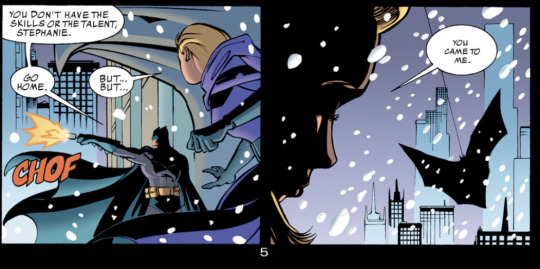
Gotham Knights #37 (2000)
But, as always, Steph says “fuck that”, and refuses to stop.
Even in the face of dear friends agreeing she should give it up.
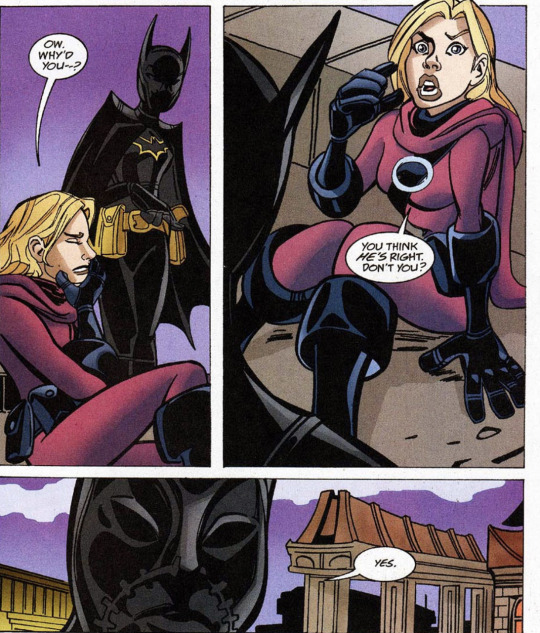
Batgirl #38 (2000)
And when Steph is brought in as Robin, she is again dismissed, in this case “Fired” soon after. She doesn’t quit of course, leading to the disastrous events of War Games.
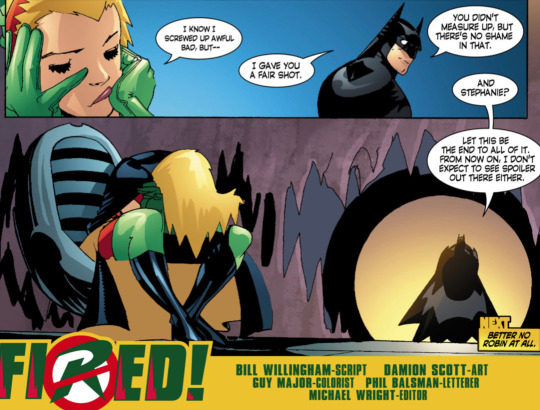
Robin #128 (1993)
And when she comes back from being “dead” she is dismissed again, by Robin.
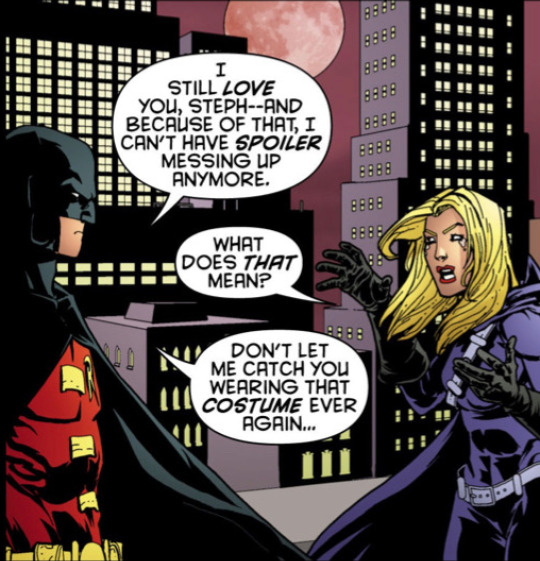
Robin #182 (1993)
This isn’t every time someone tells her to quit being Spoiler, but instead a showcase of how prevalent the Dismissal/Disregarding dynamic is for her character.
I am working on two other posts, one which will explain in depth Why the way she was “fired” as Spoiler has everything to do with Bruce Wayne’s own hangups and emotionally manipulative quirks and very little to do with her own skill level. The other will analyze why she feels the compulsion to be keep being Spoiler even after having Every reason to quit and being told to do so hundreds of times.
However, for the purposes of this post, all that matters is that this Dismissal/Disregarding dynamic exists and is a huge and reoccurring part of Stephanie’s character.
Whether or not you think she “deserved” how often she was rejected, and whether or not you think her disregarding the rejection was “good” or not doesn’t come into play here.
For now, let’s focus on the implications this dynamic has for her character in a meta sense, as a character who is used and discarded.
A character who is for all intents and purposes, the narrative punching bag. She endures character dismissal and belittling, three separate backstory instances of sexual harassment as a child and teenager, teenage pregnancy, abuse, taking care of a parent struggling with addiction, brutal and (debatably) sexualized torture, character assassination, death, retconned death, and further character assassination until 2009, where she finally gets her own solo comic, and a modicum of respect. The thing that separates the horrible shit Stephanie goes through and the bad things that happen to other characters is only rarely are Stephanie’s struggles treated as significant on their own, and almost always her narrative is used for drama or to prop up Robin Tim Drake’s plot. Very rarely does she get treated with the care and attention her character merits.
But let’s go back to that news broadcast, all the way back in Detective #647. How does she take it, when we are told, when Stephanie is told, first thing, straight out of the gate, plain and simple: No matter how good your intentions, no matter how noble your cause, you is not enough, or you’re too much, or your just not right?
It is met by a triumphantly tragic: “And?”
Stephanie hears from the VERY start the same refrain she will hear for years and years: she is not good enough, she needs to go home, she needs to quit and she does the exact thing she will continue to do every following time she is told this: she puts on the damn Spoiler outfit and she still tries anyway. Again and again.
The next time we see Stephanie Brown after this, the second time we ever see her character, she has donned the Spoiler costume, and she’s got to work. “And?” She seems to say. “As if!” She seems to shout. What a perfectly awe inspiring thing, and what a perfect summary of what makes Stephanie Brown so damn cool.
For better or worse, you cannot keep her down. I love Stephanie Brown so much.
And if you want to read a comic which understands this, which treats the terrific character of Stephanie Brown with respect and love, and which for the first time maybe ever lets her stubborn refusal to give up go her way? Read Batgirl (2009)!!
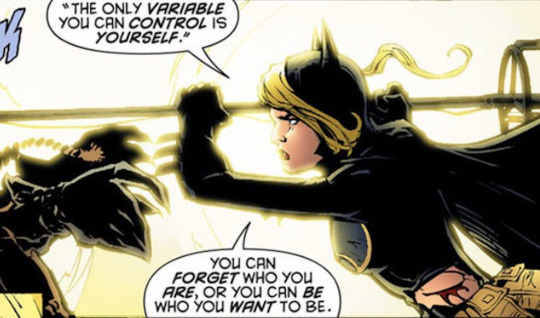
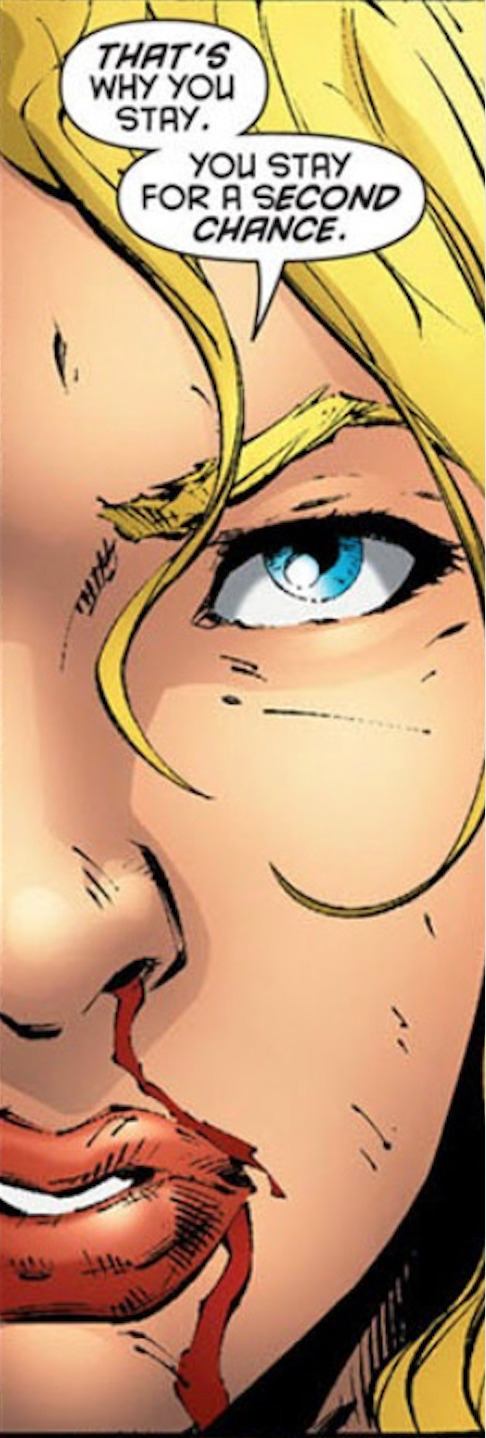
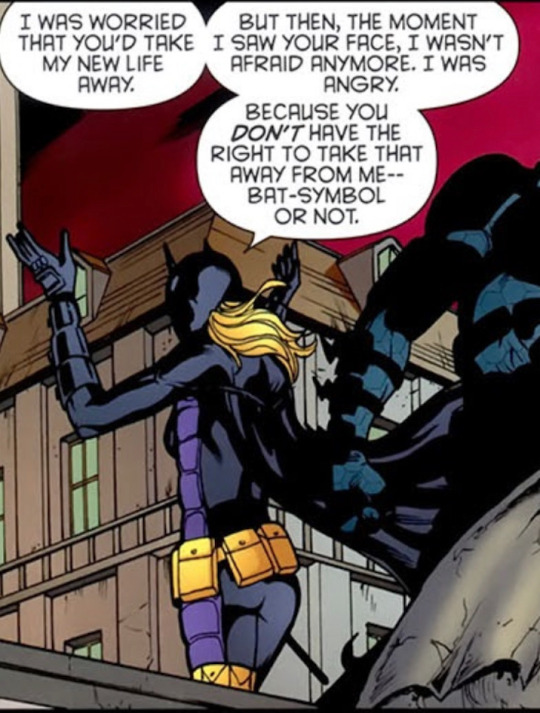
Batgirl #3 (2008) & Bruce Wayne: The Road Home - Batgirl (2010)
#dc comics#stephanie brown#stephanie brown meta#batman#batman meta#tim drake#robin 1993#dc robin#war games#batgirl 2009#batgirl 2000#cassandra cain#batgirl#mine
675 notes
·
View notes
Text
So, uh, Netflix Avatar, huh? Yeah. I guess I'll make a really long post about it because ATLA brainrot has is a cornerstone of my personality at this point.
So.
It's okay. B, maybe a C+.
That's it.
Now for the spoilers:
The biggest issue with the Netflix version is the pacing. Scenes come out of nowhere and many of the episodes are disjointed. Example: Aang escaping from Zuko's ship. We see him getting the key and going "aha!", and in the next scene he's in Zuko's room. And then he just runs out, no fun acrobatics or fights, and immediately they go to the Southern Air Temple where he sees Gyatso's corpse, goes into the Avatar state, and then sees Gyatso being really cheesy, comes out of it, and resolves that conflict. Nothing seems to lead into anything. The characters don't get to breathe.
The show's worst mistake (aside from Iroh fucking murdering Zhao) is its' first one: they start in the past. Instead of immediately introducing us to our main characters and dropping us into a world where we have a perfect dynamic where Aang doesn't know the current state of the world and Katara and Sokka don't know about the past, thus allowing for seamless and organic worldbuilding and exposition, they just... tell us. "Hey, this is what happened, ok, time for Aang!" There's no mystery, no intrigue, just a stream of information being shoved down the audience's throats and then onto the next set piece.
The visuals are for the most part great, but like with most Netflix productions, they just don't have great art direction. It feels like a video game cinematic, where everything is meant to be Maximum Cool - and none of the environments get to breathe. It's like they have tight indoor sets (with some great set design) and then they have a bunch of trailer shots. It's oozing with a kind of very superficial love.
Netflix still doesn't know how to do lighting, and with how disjointed the scenes are, the locations end up feeling like a parade of sets rather than actual cities or forests or temples. As for the costumes, Netflix still doesn't know how to do costumes that look like they're meant to be actually worn, so many of the characters seem weirdly uncomfortable, like they're afraid of creasing their pristine costumes.
The acting is decent to good, for the most part. I can't tell if the weaker moments come down to the actors or the direction and editing, but if I had to guess, I'd say the latter. Iroh and Katara are the weakest, Sokka is the most consistent, Zuko hits the mark most of the time, and Aang is okay. I liked Suki (though... she was weirdly horny? Like?) but Yue just fell kind of flat.
The tight fight choreography of the original is replaced with a bunch of spinny moves and Marvel fighting, though there are some moments of good choreography, like the Agni Kai between Ozai and Zuko (there's a million things I could say about how bad it was thematically, but this post is overly long already.) There's an actually hilarious moment in the first episode when Zuko is shooting down Aang, and he does jazz hands to charge up his attack.
Then there's the characters. Everybody feels very static - Zuko especially gets to have very little agency. A great example of that is the scene in which Iroh tells Lieutenant Jee the story of Zuko's scar.
In the original, it's a very intimate affair, and he doesn't lead the crew into any conclusions. Here, Iroh straight up tells the crew "you are the 41st, he saved your lives" and then the crew shows Zuko some love. A nice moment, but it feels unearned, when contrasted with the perfection of The Storm. In The Storm, Zuko's words and actions directly contradict each other, and Iroh's story gives the crew (and the audience) context as to why, which makes Zuko a compelling character. We get to piece it out along with them. Here - Iroh just flat out says it. He just says it, multiple times, to hammer in the point that hey, Zuko is Good Actually.
And then there's Iroh. You remember the kindly but powerful man who you can see gently nudging Zuko to his own conclusions? No, he's a pretty insecure dude who just tells Zuko that his daddy doesn't love him a lot and then he kills Zhao. Yeah. Iroh just plain kills Zhao dead. Why?
Iroh's characterization also makes Zuko come off as dumb - not just clueless and deluded, no, actually stupid. He constantly gets told that Iroh loves him and his dad doesn't, and he doesn't have any good answers for that, so he just... keeps on keeping on, I guess? This version of Zuko isn't conflicted and willfully ignorant like the OG, he's just... kind of stupid. He's not very compelling.
In the original, Zuko is well aware of Azula's status as the golden child. It motivates him - he twists it around to mean that he, through constant struggle, can become even stronger than her, than anyone. Here, Zhao tells him that "no, ur dad likes her better tee hee" and it's presented as some kind of a revelation. And then Iroh kills Zhao. I'm sorry I keep bringing that up, but it's just such an unforgiveable thematic fuckup that I have to. In the original, Zhao falls victim to his hubris, and Zuko gets to demonstrate his underlying compassion and nobility when he offers his hand to Zhao. Then we get some ambiguity in Zhao: does he refuse Zuko's hand because of his pride, or is it his final honorable action to not drag Zuko down with him? A mix of both? It's a great ending to his character. Here, he tries to backstab Zuko and then Iroh, who just sort of stood off to the side for five minutes, goes "oh well, it's murderin' time :)"
They mess with the worldbuilding in ways that didn't really need to be messed with. The Ice Moon "brings the spirit world and the mortal world closer together"? Give me a break. That's something you made up, as opposed to the millenia of cultural relevance that the Solstice has. That's bad, guys. You replaced something real with something you just hastily made up. There's a lot of that. We DID NOT need any backstory for Koh, for one. And Katara and Sokka certainly didn't need to be captured by Koh. I could go on and on, but again, this post is already way too long.
It's, um, very disappointing. A lot of telling and not very much showing, and I feel like all of the characters just... sort of end up in the same place they started out in. I feel like we don't see any of the characters grow: they're just told over and over again how they need to grow and what they need to do.
To sum it up: Netflix Avatar is a mile wide, but an inch deep.
#avatar the last airbender#atla#atla spoilers#avatar netflix#netflix avatar#atla live action#netflix atla#zuko#iroh#katara#aang#sokka#zhao#ozai#review
2K notes
·
View notes
Text
Original post:

amirdrassil: "datamined veilguard character descriptions google doc is now complete. i've even organised all the characters into their respective factions and added a clickable table of contents!! yippee!!! [link]" [source]
Please note that this work and document resource was put together by amirdrassil on Twitter! they kindly gave me permission to cross-post it here. 🙏
DA:TV spoilers and long post under cut.
VEILGUARD DATAMINED CHARACTER DESCRIPTIONS These are all taken directly from the game files; wherever a character had interesting additional information such as accent, age range, or appearance, I’ve also included it.
GODS & SPIRITS
RETURNING CHARACTERS
COMPANIONS
CROWS
VEIL JUMPERS
WARDENS
SHADOW DRAGONS
LORDS OF FORTUNE
MOURN WATCH
KAL-SHAROK
MISCELLANEOUS
UPDATE (19/11/24): Added Teia, Viago, Anaris, Aelia, Hezenkoss and Rana. (Thank you to @/ZILVYR on Twitter for finding these ones!) I did my best to look through the files as thoroughly as I could, but if you find any more I missed, feel free to DM me on Twitter (@amirdrassil) and I’ll add them with thanks. :-)
I’m adding a disclaimer here, because I’ve seen a lot of people treat these datamined descriptions as absolute canon. Many of them are remnants of scrapped or altered storylines, meaning that they no longer align with the finalised story that the game presents. Please take everything you read here with a grain of salt, and where the game’s content itself directly contradicts the datamining, the former should always take precedent over the latter. At least as far as “canon” goes! And of course, it goes without saying, but please don’t use any of this datamining as an excuse to be mean to anyone; please understand that game development is a lot of hard work, and storylines are scrapped all the time as writers get new ideas or are faced with inevitable roadblocks from the game system side of things! No matter what, Veilguard was made with love. Anyways, feel free to use any of this as fuel for fanfiction, fanart, headcanons, or just healthy discussions about what the game might’ve been. Thank you very much, sorry for rambling and please enjoy!! :-)
GODS & SPIRITS
SOLAS AGERANGE: 40 CHARACTERDESCRIPTION: Solas, from the previous game. (Some characters also have a TTS voice assigned to them, and Solas’s is “PeterSad22k_HQ”, which makes me laugh/cry, as no other major character so far has had their TTS voice specified as being the “sad” variant.) ELGAR’NAN AGERANGE: 99 ACCENT: British Isles; an ancient contemporary of Solas. CHARACTERDESCRIPTION: Ancient elven god-king. Blighted. GHILN’NAIN AGERANGE: 35 ACCENT: British Isles; an ancient contemporary of Solas CHARACTERDESCRIPTION: Ghilan'nain is our sinister Mad Scientist god. Analytical and curious, she uses magic to mutate people into powerful but disturbing forms. She often lists things in a clipped fashion, cataloguing as she sees. She's obsessed with experimenting on all kinds of living beings, viewing everyone (except her fellow god, Elgar'nan) as potential "stock". She's pitiless about her work—Ghilan'nain will happily slice open a hundred people for parts—but is not purposefully sadistic. It's nothing personal. She can be angered, however, by people interfering in her plans. When she is, rage runs cold. Some backstory: Ghilan'nain is an ancient, now corrupted, elven god. She rose to power thousands of years ago by creating living wonders, and had the distinction of being the only mortal elf uplifted into the pantheon. She embraced the corrupting power of a force called the blight in order to improve her magic, and has been unalterably twisted by it over the centuries. BETRAYAL OF FELASSAN CHARACTERDESCRIPTION: A powerful undead born from Solas's regrets and betrayals (in this case, Solas's murder of his friend Felassan by stabbing him in the back).
FALL OF THE PROTECTOR CHARACTERDESCRIPTION: A powerful undead born from Solas's regrets and betrayals (in this case, the death of Mythal). SLAUGHTER OF THE PILLARS CHARACTERDESCRIPTION: A powerful undead born from Solas's regrets and betrayals (in this case, the murder of the Titans). SPIRIT OF PROFIT CHARACTERDESCRIPTION: A Spirit of Profit who has set up shop in the Crossroads. They are friendly, but very single-minded and tend to speak in one or two word sentences, mostly about profits. SPEECHPATTERN: Simple, clear expressions of intent. This merchant is a spirit with a singular mind (i just thought this one was neat!) GENERAL FELASSAN AGERANGE: 40 CHARACTERDESCRIPTION: The second in command of a resistance army. You've an elf who's fought against the tyranny of your gods, cruel despots who've enslaved your people. You're practical, level-headed, and have good sense for what other people are feeling, which makes you well-suited for your role. Your leader is an elf called Solas, a powerful mage who isn't quite the people person you are. You respect him, and are there to help him with whatever he needs - especially when he needs guidance about being the face of a resistance. THE CARETAKER SPEECHPATTERN: Simple, mysterious, with a sense of vast wisdom and power ARCHETYPE: Angel / otherworldly helper who gives the player what they truly need, not necessarily what they think they want. CHARACTERDESCRIPTION: A mysterious masked and cloaked spirit. They are patient, otherworldly, and helpful... in their own way. The Caretaker is the guardian of the Lighthouse, a magical shelter. Unknown to the player, the Caretaker is what remains of a truly ancient dragon, who long ago took on the form of this spirit. Underlying their patient and otherworldly nature is a sense of strength. The Caretaker was summoned centuries ago by ancient elves, the original builders of this place. Now it has new inhabitants: the player and their friends. You're guiding them through the mysteries of the Lighthouse, but do not give any straight answers. It's important to you they bridge the gap themselves. NOTE: The Caretaker is referred to as they/them because they're a supernatural entity (as opposed to the more normal human non-binary characters in the game.) We'd like a feminine voice to differentiate them from some of the other spooky/mysterious spirits in the game who sound masculine (e.g. Vorgoth.)
SPIRIT OF CHAOS CHARACTERDESCRIPTION: A spirit of chaos and freedom, unleashed by Solas to break through a labyrinth to his ally Mythal. SPIRIT OF NEED CHARACTERDESCRIPTION: A spirit heavily implied to be the Caretaker in another era, speaking with Solas about the attempt to rescue Mythal. Speaking with the spirit, Solas makes it clear that he will sacrifice anything to save Mythal. ANARIS AGERANGE: 35 (no other info except what’s in cyrian’s description) XENON THE ANTIQUARIAN CHARACTERDESCRIPTION: A nobleman who made a deal for immortality which did not include eternal youth, Xenon is the master of the Black Emporium, a shop selling curiosities from his personal collection of magical items.
RETURNING CHARACTERS
THE INQUISITOR AGERANGE: 30 APPEARANCE: Inquisition uniform under a long cloak with hood. ARCHETYPE: Relatable leader and mentor CHARACTERDESCRIPTION: The Inquisitor, the protagonist from DA:I. Confident, knowing, they are still the head of a powerful organization, but now act in a mentor role. They would bring too much attention if they get personally involved, so they are looking for the right people to act for them. CHARTER AGERANGE: 30 CHARACTERDESCRIPTION: A returning character from DA:I, Charter serves as Rook's link to/mouthpiece of the Inquisitor and what's left of the Inquisition. VARRIC CHARACTERDESCRIPTION: Varric! DORIAN CHARACTERDESCRIPTION: It’s Dorian! MORRIGAN AGERANGE: 40 SPEECHPATTERN: Morrigan-y. CHARACTERDESCRIPTION: Returning character from previous games. ISABELA AGERANGE: 50 APPEARANCE: Well-aged but perfectly maintained warrior gear for close and brutal fighting. Two possible appearances, depending on how the player resolves her past: 1. Dark black dyed hair 2. Red hair with streaks of grey CHARACTERDESCRIPTION: Isabela from Dragon Age II
COMPANIONS
HARDING AGERANGE: 29 ARCHETYPE: Girl-next-door CHARACTERDESCRIPTION: Scout Lace Harding, from Inquisition. It's been almost a decade and Harding's a little older and wiser, but she still thinks of herself as the simple country girl from Ferelden. Harding is cheerful and friendly, and always tries to be positive. She is kind, warm and compassionate, quick to laugh and slow to anger. EMMRICH AGERANGE: 50 CHARACTERDESCRIPTION: Follower - will have an audition script. MANFRED CHARACTERDESCRIPTION: An undead skeleton that serves as Emmrich's faithful assistant and companion. Manfred is curious, loyal, innocent, and wants to be helpful. He doesn't speak at first, only replying in hisses that express his mood. Over the course of the game, however, as he learns more, Manfred eventually surprises everyone by speaking in short, one or two word sentences. ASSAN (listed as “GRIFFON”) CHARACTERDESCRIPTION: Davrin's griffon. A VO character so he can squawk and screech during banter and ambients. LUCANIS AGERANGE: 36 ACCENT: Hint of Italian, but not as strong as Zevran's. (He is from a coastal city in Antiva, which had an influx of Tevinter refugees from Seheron after the Qunari invaded 100 years or so ago. That’s why he looks and sounds different from Zevran and Josephine.) APPEARANCE: Lean, sinewy, handsome, but haunted Antivan human man. Mid thirties. CHARACTERDESCRIPTION: Once the heir to the First Talon and the Antivan Crows' best mage killer, Lucanis now bears scars both physically and mentally from his time as a brainwashed executioner for an evil mage cult. No longer the pragmatic assassin always in control, he wrestles with becoming what he’s spent his life hunting: a demon-possessed abomination. He longs to return to his former glory, but the monster inside him demands blood and vengeance. With his future hanging in the balance, Lucanis must decide whether to give into the demon or control it.
DAVRIN (he doesnt have anything aaaaa) BELLARA (she doesnt have anything either aaaaaaaaaa) NEVE AGERANGE: 30 CHARACTERDESCRIPTION: A mage who knows the streets of Minrathous, Neve helps investigate crime in Tevinter's capital. Hired by Varric to assist in the fight against Solas, Neve brings her unique blend of time and ice magic, along with her investigative skills, to the team. Neve is clever and driven, with a dry-but-playful sense of humour. She can be cynical about the world - especially Minrathous - but she believes in doing the right thing herself and has a strong sense of duty. TAASH CHARACTERDESCRIPTION: Taash is a Qunari agent with a specialization in infiltration -- a thief, basically. She can scale buildings, pick locks, and take out enemies with quick and brutal efficiency. She is also blunt and laconic -- more likely to answer with a single word than give you a big long monologue. She's not grumpy as much as badass deadpan -- she doesn't trust people in general, and she doesn't like thinking or talking about her feelings, but she believes in what she does. (Taash correctly has the “NonBinary” gender tag, but unfortunately the CharacterDescription field misgenders them. However, it also seems there are some things here and there that changed in early development, like the Qunari agent thing.)
CROWS
TEIA AGERANGE: 28 ACCENT: Italian/Spanish SPEECHPATTERN: Warm APPEARANCE: Elven female, mid to late twenties CHARACTERDESCRIPTION: Passionate, showy, hot-blooded, flirtatious, and arrogantly confident. Teia believes she's a celebrity athlete who will die gloriously before she gets old and live forever in song. She has no guilt about being an assassin, and thinks anyone who judges her for it just doesn't understand how things work in Antiva, or indeed anywhere in the world where powerful men play games. Abandoned as a child, she has a soft spot for the downtrodden. VIAGO AGERANGE: 32 ACCENT: Italian/Spanish SPEECHPATTERN: Formal, hint of snobbiness APPEARANCE: Human male, early thirties RACE: Human (Brazilian) CHARACTERDESCRIPTION: Calm, ambitious, and ruthless, Viago is the bastard son of the late King of Antiva. As a high-ranking member of the Crows, Viago has just as much influence as the Monarchy, but he still resents the fact that he is not a legitimate heir and feels his birthright was stolen from him. Beneath his cool exterior is a lot of anger and frustration. He will not be satisfied until he sits upon a throne. ILLARIO AGERANGE: 35 SPEECHPATTERN: Charming but with a hint of smarminess. ACCENT: Italian APPEARANCE: Ativan pretty boy CHARACTERDESCRIPTION: Antivan pretty boy. Mid 30's. Illario is a power hungry assassin who cares only for himself. On the surface, he is a fun-loving, upperclass Antivan with a weakness for wine, duels, and gambling. But beneath that shallow facade is a calculating, ambitious man with grand plans for the Crows.
SPITE SPEECHPATTERN: Taunting, sing-songy, creepy CHARACTERDESCRIPTION: The demon trapped inside Lucanis's head. Spite was once a Spirit of Passion drawn to Lucanis's will to live, but years of torture and a desire for revenge has twisted him into a Demon of Obsession. CATERINA AGERANGE: 80 ACCENT: Italian/Spanish APPEARANCE: Older Korean-Spanish or Korean-Italian woman (from the same region as Lucanis). Can easily play the part of both sweet grandmother and mafia boss. CHARACTERDESCRIPTION: The Godmother of the Antivan Crows. Sassy, ruthless older woman of power, who will do anything for the success and protection of her family/house. ZARA AGERANGE: 35 APPEARANCE: Beautiful human mage. Mid 30’s. SPEECHPATTERN: Soft and teasing with a Tevinter accent. Upperclass, so formal, but not cold. More of a sensual snob than an ice queen. CHARACTERDESCRIPTION: A vain, hedonistic Tevinter Magister, who uses the blood of her slaves to stay young and beautiful. She is Lucanis's nemesis and is the one responsible for forcing a demon inside his head. CALIVAN AGERANGE: 55 SPEECHPATTERN: Formal, snide CHARACTERDESCRIPTION: Calivan is the prison warden in charge of the Ossuary. He is as cruel as he is curious and likes to experiment on his inmates with blood magic. GOVERNOR IVENCI AGERANGE: 45 SPEECHPATTERN: Formal, curt, demanding APPEARANCE: A Trevisan government official. They don't go around armed, because they secretly know they don't have anything to fear from the occupation. ARCHETYPE: Money-respecting Official demanding the heroes stop disrupting the status quo. CHARACTERDESCRIPTION: Governor Rayan Ivenci is a non-binary human, about 45, Trevisan with a Caucasian appearance. They used to be a mercenary and still have the skills, but have softened somewhat as they aged. They have been a government official for a decade, and have grown sick of being a toothless figurehead. The Crows are the true authority in Antiva, relegating officials like Ivenci to almost symbolic bookkeepers. Ivenci thinks the Crows are spoiled mascots, and Treviso should be ruled by serious figures who don't waste time on petty rivalries and theatrics. Ivenci allowed the occupation and has made steady profit from it, selling out Treviso with the intent that the Crows would be killed fighting the Antaam, expecting that and when Antiva eventually ousted the Antaam, Ivenci would solidify power before Crow houses in other cities could re-establish here. Under Ivenci, Treviso would be the thin edge of the wedge that ended the Crows power. But the Butcher didn't rampage, and didn't kill all the Crows. This has left Ivenci pretending to help fight the occupation, while also chastising the Crows for stirring up trouble. Once the Butcher is dead, Ivenci casts aside any pretense and simply takes power.
FLETCHER AGERANGE: 30 SPEECHPATTERN: Measured, serious. ARCHETYPE: Connected merchant guild leader ACCENT: Antivan APPEARANCE: Fletcher is a tradesperson and a skilled combatant with a bow. They are always dressed for travel. They aren't flashy, preferring to appear as their own guard instead of a merchant hawking wares. CHARACTERDESCRIPTION: Fletcher is a human Crow with merchant ties. Skilled in bows and ranged support, they are kitted for travel and protecting people and goods on the move. They are non-binary, tall with a thin build that codes slightly feminine. Ethnicity can be anything.
HEIR AGERANGE: 40 SPEECHPATTERN: Calm, measured. Almost dispassionate. ACCENT: Orlesian APPEARANCE: She is pale with short dark hair and an Orlesian accent. Dressed in good light armor befitting someone who trains others in small-weapon combat and takes the occasional hit. She was the assassin trainer in Inquisition, but it's been many years and doesn't need to match the appearance except in a general sense. CHARACTERDESCRIPTION: Heir is a Dalish elf who acts as a trainer and mentor for young Crows. JACOBUS AGERANGE: 15 ACCENT: Antivan SPEECHPATTERN: Sullen teen with an axe to grind APPEARANCE: Young, skilled, lithely muscled. Jacobus is well trained in double-daggers, but has the typical lack of discipline of an undirected teen. CHARACTERDESCRIPTION: Jacobus is a young male Crow who is in danger of losing himself to vengeance. He should be as young as we can make him. If he can't be a child, he should be no older than 15. His family were killed by the Antaam, and the hate is still fresh. Skilled in daggers, he is lithe and quick, but sullen in his mannerisms. He doesn't smile yet. Ethnicity can be anything. ARCHETYPE: Youthful spite for the world NOA DE ACUTIS AGERANGE: 55 ACCENT: Antivan SPEECHPATTERN: Formal with strangers, warmer with her brother. APPEARANCE: Older veteran Crow female duelist CHARACTERDESCRIPTION: Noa is an older female in her late 50s. She has been a Crow for all of her life, and remains capable and fit. Her build has the old-woman wireyness of a duelist's body that was fit her whole life. She is slow to smile, and is the more serious of the de Acutis siblings. Ethnicity can be anything, but needs to match her brother Neri encountered in the Crow plots. ARCHETYPE: Older sister, skilled assassin
NERI DE ACUTIS AGERANGE: 55 ACCENT: Antivan SPEECHPATTERN: Thoughtful, homespun APPEARANCE: Classic swordsman assassin, with an old-fashioned flare. He doesn't look dated, he looks distinguished. A godfather displaying modern tradition. CHARACTERDESCRIPTION: Neri is an older male in his late 50s. He has been a Crow for all of his life, and remains capable and fit. His build has the old-man-strength of a swordsman's body that was muscular his whole life, but has now lost some of the mass as he transitioned to a mentor or godfather role. He has a hard face, but is quick to a melancholy smile. Ethnicity can be anything, but needs to match his sister encountered in a later plot. ARCHETYPE: Stern but loving godfather FLEDGLING DARTONIA AGERANGE: 17 SPEECHPATTERN: Tentative due to inexperience. More confident after seeing Rook in action. CHARACTERDESCRIPTION: A young person in training to become an assassin. Nervous because of inexperience, but capable and willing. Farming background. Hunted for food. Now living in the city because the lands were lost to occupation. Dartonia and Temitri are encountered in the Crow sanctum, the Diamond casino. They chat casually with each other about how their training is going, and the things they've heard about. They are young recruits to the Crows, still getting used to their training and the strict but caring manner of their trainer, Heir. They respect and have a little fear of the veteran Crows like Viago and Lucanis. Especially Lucanis, who is a figure of some renown.
FLEDGLING TIMETRI AGERANGE: 17 SPEECHPATTERN: Over-disciplined to compensate for inexperience. They relax after seeing Rook in action. CHARACTERDESCRIPTION: A young person in training to become an assassin. Overcompensating for inexperience, but capable and willing. Traveled with a military family. Used to discipline, but has crafting hobbies like making various kinds of dolls. TREVISO GONDOLIER AGERANGE: 50 CHARACTERDESCRIPTION: A blue collar gondolier pilot who runs errands in the canals of Treviso. Used to slipping past patrols for stealthy deliveries, before and during the occupation. Fit from daily work, you are no soldier or assassin, but you help in your way. ARCHETYPE: Workaday everyman who helps the assassins get from place to place. QAMEKMASTER CHARACTERDESCRIPTION: The Antaam Qamekmaster is a fanatic who normally is in charge of brewing the horrible mind-stealing poison, qamek. Like all Antaam, he is large, muscular, and has a soldier's mentality. However, now he is giving in to the corruption of the gods. He thinks this makes him better than the regular Antaam, and he's been locked up by the Butcher because of it. When Rook finds them, they willingly succumb to the corruption entirely, and become a monstrous creature called a Reaver. Once transformed he is a massive, fleshy juggernaut consumed by fervor and rage. Most of his dialogue is combat as the transformed Reaver. CHANCE CANDIDE AGERANGE: 25 SPEECHPATTERN: Confident, with a flare for the dramatic. CHARACTERDESCRIPTION: Standard Crow garb on a young man. Chance is a stylish, dramatic Orlesian who joined the Crows to be their emmisary among the courts of Orlais. (French accent.) He has since joined the effort in Treviso, and is fighting the Antaam occupation alongside his fellow Crows. He has chosen to rally people in the underbelly of town, which is a bit of a contrast from his previous position, but that's what he likes. He's the bright spot in a dark time for many people. ARCHETYPE: Gentleman assassin
MARKET MASTER AGERANGE: 45 SPEECHPATTERN: Friendly but businesslike APPEARANCE: Market master in expensive clothes. CHARACTERDESCRIPTION: The all-business master of the market in Treviso. She's frustrated by the occupation, but uninterested in discussions about who should be in charge. She's only interested in getting whoever is at the head out of the city's business. Her name is Master Sidestreet Alidare. Sidestreet is a nickname representing her low origins and her ability to do deals on the side.
VEIL JUMPERS
CYRIAN AGERANGE: 30 CHARACTERDESCRIPTION: Bellara's brother. Zealously dedicated to the rebirth of the elves. Half-possessed by Anaris, an ancient elven would-be god who lives inside a magical mask. STRIFE AGERANGE: 50 CHARACTERDESCRIPTION: One of the Dalish faction agents. Strife is a keen-eyed hunter who grew up in the elven city slums, but was taken in by the forest-dwelling Dalish elves and taught to be an expert woodsman. He's rugged, tough, adventurous, and doesn't suffer fools. He feels some disconnect between his city-upbringing and his current role as a hunter - somtimes Strife worries he's an imposter, not truly growing up with his people, but he's tried to take their teachings to heart. Strife is loyal to those who earn his friendship, and fiercely protective of his clan. IRELIN AGERANGE: 25 CHARACTERDESCRIPTION: A Dalish elf who grew up in the woods, Irelin has learned the ancient and incredibly rare art of shapeshifting. She uses this ability to move secretly in the forest, scouting for her people. Practical and no-nonsense when it comes to defending her clan and her friends, she has a healthy distrust of outsiders, especially the humans who've persecuted and exploited her people for so long. Irelin takes a secret joy in the thrill and power of shapeshifting, however. She loves exploring as the different animals of the forest, and knows some of their paths better than anyone.
WARDENS
ANTOINE AGERANGE: 25 ACCENT: French (Orlesian) CHARACTERDESCRIPTION: Antoine is a cheerful and enthusiastic member of the Grey Wardens. He's quick-witted and willing to run with a crazy plan. Compassionate and kind, he'll put his life on the line to protect others. (filename tag is “agent_improviser”) EVKA AGERANGE: 30 CHARACTERDESCRIPTION: Evka is a devoted member of the Grey Wardens. She's a good-natured pragmatist who's calm under pressure and not easily fazed by the monsters of Thedas. Despite her professional attitude, she isn't above some mild sarcasm or gallows humour. (filename tag is “agent_tracker”) WARDEN GRETA AGERANGE: 30 CHARACTERDESCRIPTION: A Grey Warden lookout. Greta is friendly, personable, and loves being a Grey Warden. She is generally positive (though has a low moment following the fall of the Warden base Weisshaupt). Greta provides information to Rook and always welcomes a chat. If Rook is a Grey Warden, Greta has met them before--they both became Wardens around the same time. Greta doesn't know Rook well--it's more like running into an old school mate--but she likes them. WARDEN RHODRI AGERANGE: 30 CHARACTERDESCRIPTION: A Grey Warden lookout. Rhodri is determined and brave. He worries about other people, but tries to show confidence so others are not afraid. He prefers simple solutions to complex plans.
HOLDEN AGERANGE: 35 CHARACTERDESCRIPTION: The father of Mila, the little girl in Weisshaupt mission. MILA AGERANGE: 9 CHARACTERDESCRIPTION: A plucky little girl Rook meets during the siege of Weisshaupt. JAYNIE AGERANGE: 40 CHARACTERDESCRIPTION: A Grey Warden lookout. Jaynie is organized and observant. She's someone who likes to have a plan. She is a loyal friend and has a dry sense of humour. Jaynie believes you should always try your best. FLYNN AGERANGE: 30 CHARACTERDESCRIPTION: Flynn is the local physician in Lavendel. They recently went through the Warden Joining ritual which gives them Warden abilities (though they will remain a doctor). Flynn is smart and compassionate. A pacifist who is somewhat soft-spoken and has a self-deprecating sense of humour. (there’s other minor wardens with names and short personality descriptions; if you’d like any of them just let me know. to the nobody that is reading this. i have a headache rn. but i will persevere.)
SHADOW DRAGONS
TARQUIN AGERANGE: 39 CHARACTERDESCRIPTION: Tarquin is a burned-out templar who had the idealism beat out of him years ago. He now fights with the Shadow Dragons, offering a more cynical, realistic view that often contrasts with the idealistic and impulsive Viper. Tarquin is a trans man. SPEECHPATTERN: Gruff, deadpan. (filename tag is “agent_cop”) THE VIPER AGERANGE: 30 (filename tag is “agent_vigilante”) MAKAL DAMAS AGERANGE: 45 ACCENT: British/Tevinter-Appropriate CHARACTERDESCRIPTION: The secret head of a criminal organization. Calm, businesslike, and shrewd. He may run a crime network, but he has a sense of loyalty and a code. That said, he'll be violent and ruthless when needed. ELEK TAVOR AGERANGE: 30 ACCENT: British/Tevinter-Appropriate CHARACTERDESCRIPTION: Charming and friendly con artist. Friends with Neve despite being on opposite sides of the law. CAT CHARACTERDESCRIPTION: A cat. HALOS AGERANGE: 50 CHARACTERDESCRIPTION: A blunt-but-kind merchant. Knows he sells the best food in the city. Neve is his most regular customer and therefore his favourite.
LORELEI AGERANGE: 40 SPEECHPATTERN: Fereldan, from Denerim, so she should have an accent that matches our Fereldan accents. CHARACTERDESCRIPTION: Lorelei is an elf who runs the pawn shop that conceals the Shadow Dragons' hideout. Lorelei was originally from Ferelden, captured and sold to Tevinter slavers. She has since been freed thanks to the Shadow Dragons, and continues to work for them. MAEVARIS TILANI AGERANGE: 50 CHARACTERDESCRIPTION: Maevaris Tilani is a powerful, notorious Tevinter magister who was one of the founders of the Shadow Dragons. Respected by some, and hated by others, Maevaris will not rest until she achieves her dream of changing Tevinter for the better. Maevaris is a trans woman and her first appearance was in the comic book, Dragon Age: Those Who Speak. AELIA AGERANGE: 30 ACCENT: British or Tevinter-appropriate CHARACTERDESCRIPTION: A devoted member of the Venatori who believes Minrathous must return to its former glory. Neve foiled her plans in the past. Cold, determined, passionate. RANA SAVAS AGERANGE: 30 ACCENT: British/Tevinter-appropriate CHARACTERDESCRIPTION: A determined and idealistic templar. By-the-books, she believes in following the law and that rules are the best. Doesn't give up or compromise her ideals despite the corrupt system she finds herself in.
LORDS OF FORTUNE
DRAGON KING AGERANGE: 45 SPEECHPATTERN: Blunt, arrogant. A brutal warlord or crime boss. Also speaks lines in the Qunari language. APPEARANCE: Big Qunari (ox-man) with enormous shoulders and battle scars. Old enough to be a military commander, but not so old that anyone would think of him as weak. Big, brutal, mean. CHARACTERDESCRIPTION: The Qunari in charge of the Antaam in this area. Used to be a military officer, but when the Antaam went rogue, he became something like a warlord of cult leader. A powerful warrior with a booming voice. He should sound like the paragon of big dangerous evil masculinity, and he makes his warriors go through painful rituals to prove their devotion. He's strong, blunt, and devoid of mercy or empathy. Will likely kill anyone he doesn't see as useful or entertaining to him. Basically, a bad guy doing his evil bad guy best. SHATHANN AGERANGE: 50 CHARACTERDESCRIPTION: Qunari woman in her 50s. Former Qunari government worker who fled with Taash when Taash was revealed as a fire-breather. CUTTER AGERANGE: 24 APPEARANCE: A Qunari, but only about as tall as a human -- short by Qunari standards. Dresses as a mercenary, fashionable because he's full of himself. CHARACTERDESCRIPTION: Cutter is Qunari, but he grew up in Rivain and acts human (ie, he does not follow the Qun or even know much about it). He's a junior member of the Lords of Fortune, the same mercenary band Taash is in. He's young, cocky, and jealous of how strong and competent Taash is. He wants the respect Taash has earned, and when he doesn't get it, he betrays Taash and sells them out to the Dragon King. Generally speaking, he should act with the kind of smug, entitled confidence of someone who doesn't have much real-life experience -- bluster with jealous insecurity underneath.
KARASH AGERANGE: 50 SPEECHPATTERN: A little stilted and formal, because he grew up speaking another language. CHARACTERDESCRIPTION: A middle-aged Qunari man who was a civilian navigator and weather expert assigned to work on a military vessel. After seeing the military commit war crimes, he deserted, and now lives alone on a beach, doing odd jobs and keeping to himself. He is polite but withdrawn, a little cautious around strangers. Taash (and Taash's mother, Shathann) bring him food from time to time, and he is much more comfortable around Taash, talking to her more like an old uncle. (Again, incorrect pronouns used for Taash here in the character notes.)
MOURN WATCH
MYRNA AGERANGE: 25 CHARACTERDESCRIPTION: Myrna is a necromancer from Nevarra. Utterly precise diction, calm demeanor. Crisp, polite, and intimidatingly competent. Myrna often speaks in declaratives, and absently drops archaic or obscure words at least once a conversation. She's not unfriendly, however, and firmly on the side of those doing good. Myrna is part of the Mourn Watch, an elite group of necromancers who run Nevarra's sacred repository of the dead: the Grand Necropolis. They also protect people from occult dangers, a duty she takes seriously. VORGOTH CHARACTERDESCRIPTION: Vorgoth is deep-voiced, solemn, and imposing. They're a member of the Mourn Watch, an elite group of necromancers from the kingdom of Nevarra. But what Vorgoth is exactlyâtheir species, age, gender, whether or not they're aliveâis a mystery, shrouded and masked in a cloak. Vorgoth clearly has supernatural powers, however. Even their voice has an otherworldly echo. Vorgoth doesn't speak much, and only in short sentences. As one of the Mourn Watch, they help guard Nevarra's sacred burial complex, the Grand Necropolis. Like all Watchers, Vorgoth is also sworn to stop occult threats to this world, and takes this duty seriously. NOTE: Vorgoth is masculine in appearance (tall, broad) and voice, but their pronouns are "they/them". Vorgoth does not use they/them because they are non-binary (as opposed to our more typical non-binary characters); they use them because they're a total unknown (and may be a pluralistic entity; in the rare instance Vorgoth refers to themselves, they use "we" not "I".) HEZENKOSS AGERANGE: 50 CHARACTERDESCRIPTION: Arrogant, supremely confident, and spiteful, Johanna Hezenkoss is a "mad-genius" necromancer supervillain with grand plans to conquer the kingdom of Nevarra. Hezenkoss is all feverish energy and big, sudden gestures. She is constantly fueled by an overwhelming ambition and rage. Hezenkoss is probably as intelligent as she boasts, incredibly powerful, and filled with a seething resentment that people try to keep stopping her from ruling everything. Foremost among these people is Emmrich Volkarin, her former friend and fellow necromancer. Johanna and Emmrich have known each other for decades-they used to work on magical research together in the Mourn Watch, an elite order of Necromancers. They had a falling out when a power-hungry Johanna started practicing forbidden necromancy and was kicked out of the Watchers for it. Ever since then, Johanna and Emmrich have clashed as he's tried to stop her villanous schemes. In this game, Hezenkoss has crafted her most diabolical plan yet: a 10-story tall bone golem that can drain peoples' souls and crush anything in its path. She'll stop at nothing to complete it so she can take over Nevarra's capital city. Emmrich and his new friend Rook, frustratingly, stand in her way.
LICH LORD CHARACTERDESCRIPTION: This is lich: an ancient, undead mage. Her speech is formal, authoratative, and occasionally sharp when she has little patience for the living. Speaks in shorter sentences, as she's so old she's fallen out of the habit of vocalizing too much. While impossingly sinister-looking, she's not evil. She just has a viewpoint that thinks in centuries instead of years. KEEPSAKE CHARACTERDESCRIPTION: A spirit that guards the Grand Necropolis, an enormous underground complex full of the sacred dead-and undead. There's a lot of possessed skeletons wandering around down there.�� Keepsake manifests as a glowing, floating, see-through skeleton in a shroud. Keepsake has worked with the necromancers who take care of the Necropolis for ages, and knows a lot about what's going on down there. Sometimes mocking or sardonic, with a dryly morbid sense of humor, it's still dedicated to helping people. Keepsake always appears with its companion spirit, Curio, who's the more positive and upbeat of the pair. CURIO CHARACTERDESCRIPTION: A spirit that guards the Grand Necropolis, an enormous underground complex full of the sacred dead-and undead. There's a lot of possessed skeletons wandering around down there. Curio manifests as a glowing, floating, see-through skeleton in a shroud. Curio has worked with the necromancers who take care of the Necropolis for ages, and knows a lot about what's going on down there. Its chatty and friendly, often deeply curious. A strange, whimsical being, intrigued by the mortals who wander through. Curio always appears with its companion spirit, Keepsake, who's the more sardonic and cynical of the pair.
SEALED SPIRIT CHARACTERDESCRIPTION: A prideful, ancient demon that's been sealed away for centuries. You're malevolently curious about what makes these foolish mayfly mortals tick. As part of your imprisonment, you've been splintered into multiple bodies with the same mind. You use them to goad the player, hoping they'll try to defeat you, because you think you can manipulate them into freeing you from your prison. If they do, you have a surprise for them: once freed, you can possess an undead dragon, wrecking untold devastation on the land that thought it could chain you.
KAL-SHAROK
STALGARD AGERANGE: 40 CHARACTERDESCRIPTION: Stalgard is a dwarf from Kal-Sharok, a mysterious dwarven city that has very little contact with the outside world. Stalgard is stoic and steadfast and serious, with a strong sense of honor. DURRA CHARACTERDESCRIPTION: Durra is a dwarf from Kal-Sharok and Stalgard's sister. She is one of Kal-Sharok's historians, known as "Stewards of Memories." Much like her brother, Durra has a strong sense of honor, but is a lot less serious. STONE ORACLE CHARACTERDESCRIPTION: The Oracle is a mysterious entity. known to the Kal-Sharok dwarves. They revere her as a spiritual figure. She is connected to the Titans and makes herself known through a strange rock statue. The Oracle was originally Shaper Valta (first seen in DAI's 'The Descent' DLC). After Valta connected with the Titan in the Wellspring, she became the Oracle and made herself known to the Kal-Sharok dwarves. All Oracle lines should have audio processing on them.
MISCELLANEOUS
THE SCHOLAR CHARACTERDESCRIPTION: A self-important, uptight scholar. He is trying to prove himself to the academy and will go to any means to do so--including murder if that's what must be done. THE EXECUTOR APPEARANCE: Human-appearing CHARACTERDESCRIPTION: A masked and hooded figure that speaks like someone unfamiliar with language in general. Stilted, awkward, but with a low menace. SPEECHPATTERN: Stilted. Is trying to form words from thoughts that are far more complex than a regular person's.
[source]
again please note that this work and document resource was put together by amirdrassil on Twitter! they kindly gave me permission to cross-post it here. 🙏
#dragon age: the veilguard#dragon age the veilguard spoilers#dragon age: dreadwolf#dragon age 4#the dread wolf rises#da4#dragon age#bioware#video games#long post#longpost#amirdrassil#thankyou ^^ 🙏#ref stuff#signal boost#solas#felassan#Best Elf#morrigan#queen of my heart#lgbtq#strife#alcohol cw
362 notes
·
View notes
Text
where do we stand


summary: you're tired of aitana's mixed signals and someone on the spanish team loves to get you all flustered. aitana is definitely not jealous.
spoiler alert: that someone is none other than jenni hermoso.
a/n: more like fulfilling two fantasies in one
prequel, part one, part two, part three
this national break had come in handy for you and lucy. england was set to play a few matches in spain, so you were able to sneak in a break between trainings to go see your club teammates and you managed to check in the same hotel as them for the time being.
you were both getting antsy as the game was approaching its end and spain was in the lead by one goal.
when the referee blows the final whistle, you exhale in relief and lucy stands up, cheering, quickly pulling you up to celebrate with her.
it takes some time for the stadium to start clearing up, with both teams doing their laps around the pitch to thank the fans, but once it was empty enough you and lucy walked down to the field to congratulate your teammates.
you ran up to ona, the girl grabbing your waist so she could lift you up and down with excitement, "ayyy oni!!" you laughed at being manhandled, when you noticed aitana.
her smile was radiant as she was cheering with salma and mariona. you didn't know if you should approach her or not, your situation a bit complicated as of now. explaining it was no easy task either.
you were shy around everyone when you first transferred to barça, although over time they managed to crack your walls and gain your trust. especially aitana, the girl getting closer and closer to you each day. you eventually became best friends, until one night aitana drunkenly confesses she wants to kiss you. so then, your friendship changes into a… situationship? the next day you talk about it, aitana doesn't know what she wants but doesn't want to lose you either. you go back to normal as if nothing happened. but something does happen. during movie night at mapi and ingrid's for team bonding, you and aitana are in the corner of the couch whispering to each other, in the dark, when the catalan tentatively kisses the corner of your mouth. when you drop her off at home later that same night, you kiss her. she brings you inside, which turns one kiss into multiple. what could be defined as innocent kisses in each other's houses eventually become not so innocent make out sessions behind closed closet doors at training. but you're not dating. aitana whispers into your secret kisses that she can't date, she doesn't have time, she needs to focus. so you wait, and wait, and wait. until she's pulling away again and national break comes and she barely messages you, apart from the friendly "good luck" message.
so now here you were, in close distance to her again. you were friends, right? so friends congratulate friends. that's what she wants, so that's what you'll give her.
you turn your attention back to ona and squeeze her shoulders, "best defender in the making! just you wait until you have to face our lessi russo." you tease her by patting her cheek. ona rolls her eyes with a smile, "voy a estar preparada, tonta. what did you think of the game?" she now asks both you and lucy, as the latter approached, having been talking to alexia. "ehh, más o menos." lucy answers, banter present in her voice. ona mocks her and you chuckle, leaving them to it as you walk over to aitana.
"nice goal, bonmatí." you lightly kicked her butt with your foot to get her attention. she turns to you and immediately launches herself into your arms with an infectious smile. it must have been the adrenaline of the win, you think, a bit surprised. nonetheless, you hold her in your arms. "i saw you in the stands." she affirms once she let go of the hug to look at you tenderly. "hm, i might have been your lucky charm then." you shrugged nonchalantly and whipped your hair over your shoulder. "sí, obvio." aitana went along with your joke, nodding with a fake serious expression.
suddenly a body slammed into you both, one tattooed arm being wrapped around your shoulder and the other around aitana's. "entonces, chicas, vamos a celebrar la noche entera?" you look up to see jenni hermoso flashing you a dazzling grin.
you had met jenni a few times before, with her visiting alexia every now and then, but you were never brave enough to start a conversation with the tall woman. truth was, she was extremely intimidating to you, probably because she was also extremely hot. however, you had to admit that, as an opponent, she was in addition, extremely annoying. you'd had some interactions in the field whenever england had to play against spain and jenni knew exactly how you worked. it's like she would previously study your every move so she knew how to push your buttons. if you were trying to get the ball, she wouldn't leave your side, if you were getting ready to receive a corner kick with your teammates, she would stand behind you and place her hands on your waist, if she tackled you she would offer her hand with a smug smirk.
you were terrifically infuriated with how easily she could mess with your head on the field and outside the field after a game, often leaving a dm on your instagram saying she couldn't wait to play with you again, followed by a winky face emoji.
right now, her strong arm around you and the way she was grinning at you only managed to redden your cheeks as aitana took the lead in answering her question with a laugh, "pues claro!" jenni ruffled her hair in approval and turned to you, "can i count with you as well?" she asked with challenge in her eyes. "aren't you a bit old to be partying all night?" you challenged back, forcing yourself to keep a straight face and not smile with amusement. that only prompted her grin to grow even wider and her hand to relocate from your shoulder to the side of your neck, playing with your hair. your breath hitched and suddenly you weren't playful anymore, far too aware of jenni's touch and her gaze. "so you do have a mouth." jenni remarked, the stupid smirk never leaving her face.
aitana caught notice of this flirty interaction between you two and felt something boil in her chest, an ugly feeling she couldn't quite tell what it was but didn't like at all.
–
the club was already full when you got in with lucy and ona later that night, music blaring and people filling the dance floor. you noticed aitana dancing with some of the girls, a little too close for your liking. but she didn't want you like you wanted her, that's what you needed to remind yourself of. therefore, you might as well find a way to have fun tonight without her. you three reached the tables where most of the girls were gathered to greet everyone.
you swiftly made your way to the bar, ready to start your fun. you were waiting for the bartender when you felt a breath on your ear, "you know, standing behind you outside of a football field can be even more exhilarating than i thought." you recognized jenni's voice right away and a smile slowly formed on your face. this, whatever it was, could be part of your fun, right?
you turned around and ignored your instinct to take a step back out of surprise, given how close jenni was to you. your eyes naturally scanned her body before your brain could even scold you for it and force you to put on a nonchalant mask. they finally looked up at her face, blush already visible on yours. the always present and annoying smirk she had on when talking to you turned to the bartender to order you two a drink.
"you know, i always wondered when you were going to finally talk to me, princesa."
"why would it matter to you?"
she cocked her head to the side, eyeing you curiously.
"i like corrupting pretty innocent girls who look like they could rip my head off in the field but then avoid me like the plague." she bit her lip, trying to hold off an amused smile when you roll your eyes.
"why have you never done so before, then?"
"alexia doesn't let me get too close to her players – and it seems she's not the only one." she points her head towards aitana, who's been watching you two interact from the dance floor with a frown on her face.
you turn back to the bar to grab your drink and begin gulping it down, trying to keep your mind off of the catalan that up to that point had you wrapped around her little finger. "maybe you just have a bad reputation." you bite on the piece of lemon it was given to you and lick the bitter taste off of your lips. you noticed that had caught jenni's attention and asked, now with a small smirk, "should i be wary of that?"
her eyes never left your face as her strong hand carefully moved up your neck to your jaw, pulling you closer. you could feel her breath on your lips when she goes "i want to do bad things to you but i think it's something you should test yourself."
your heart starts beating faster, blood rushing to your cheeks and your thighs pressing together involuntarily. just one move and your lips would be touching hers.
all of a sudden, your body is jerked away abruptly from the bar and jenni by a hand grabbing your arm and leading you in the direction of the club's exit. you look up to see aitana and let yourself be dragged outside where you pull back your arm, making her face you. "what exactly do you think you're doing, aitana?!" the rush and amount of emotions you had felt in the span of a minute made you question her with annoyance in your voice.
"that's what i should ask you. que haces con jenni?" aitana looked at you incredulously, an angry scowl visible on her face. you had only seen her angry on the pitch, and even then those moments were rare. but now she was pissed at you? for what? that only aggravated you further.
"what do you mean 'what am i doing with jenni'? you and i are nothing. you made it clear yourself multiple times. you can't have me whenever you want me and expect me to wait when you don't feel like it anymore. so do not tell me who i should or should not hang out with."
"but it's not just hanging out, is it?" she puffs air out of her nose, the frown never leaving her face.
"do you actually care or are you just jealous someone other than you is getting my attention?" you bite back.
"i'm not jealous. i'm just curious." she mumbled, crossing her arms and looking away, doing everything now to avoid your furious gaze.
"oh, so you're just curious. that's why you dragged me away from her like that." you say, sarcasm on the tip of your tongue.
she finally looks at you with an exasperated sigh, "and i'm worried. of course i care about you! and i know jenni isn't looking for anything other than–" she cuts herself off for a moment, knowing what she would say next would make her sound like a hypocrite.
"well, then that makes two of you, doesn't it?" the anger in your voice subsides but your tone is still bitter. aitana furrows her eyebrows together, a sad frown taking shape in her face at your words.
"the difference, aitana, is that if you tell me, right here, right now, that you want something with me, that you're not going to rush into my arms one minute and act like nothing happened the next, i'll stay. i won't go back in there to jenni or anyone."
"i–" aitana stutters, you can see her eyes begging you not to go back but her voice can't say the same. "i--i'm sorry. tú sabes que no puedo hacerlo." she whispers, almost as if she's ashamed to say it.
you nod, fighting back your tears. silence looms between you both before you finally answer back, "that settles it then." you clear your throat before your voice can betray you any further for showing so much vulnerability in that moment. you turn around and start walking away, picking up your phone to call an uber when you see a message.
"28A 3rd floor. i expect to see you there ;) - jenni"
you seriously couldn't understand how this woman was capable of exuding cockiness even through text.
–
you managed to stay in your hotel room for about 30 minutes before temptation and frustration got a hold of you and you marched your way to jenni's.
you take a deep breath and knock on the door.
immediately you can't resist the urge to roll your eyes when jenni opens the door with a smug smirk on her face, crossing her arms and leaning against the door frame.
"took you long enough."
"shut up." you pushed at her chest and made your way inside.
#aitana bonmati#aitana bonmati imagine#aitana bonmati x reader#jenni hermoso#jenni hermoso x reader#jenni hermoso imagine#woso x reader#woso imagine#woso fanfics
901 notes
·
View notes
Text
A Completely Normal Rest Stop

Update 4: Chapter 2 Part 2 - The Rest Stop
Featuring...
Merlin's Guide to Minor Enemies
A bucketload of owed texts & e-mails to the MC
Decisions of great import... just where are you sleeping in that motorhome during this Among Us game?
Shopping? Fleeing? Stalking Merlin? Chapter 2 wedding proposals? ̵S̵a̴b̷o̴t̸a̷g̵e̵ ̵t̷h̴e̶ ̷m̸o̵t̵o̴r̷h̸o̷m̷e̶/̷ Actually having a completely normal time because you sidestepped all the spooky shenanigans? (But what fun would the latter be?)
A ton of branching everywhere in the second part of this update, so try replaying again with a few different choices.
A̴ ̴C̴o̶m̴p̷l̷e̵t̷e̴l̴y̵ ̶N̴o̷r̸m̴a̶l̵ ̵G̴a̴s̸ ̶S̵t̵a̷t̷i̶o̷n̸ ̵S̴t̸o̷p̷
Nothing to see here but a completely normal gas station & convenience store at a completely normal rest stop. Moving along now.
Play the Updated Beta Test
(Since there were bugs & typos reported throughout Chapter 1 & 2, your current saves are probably going to reset to the beginning of each section of the game. If things get too wonky, you might want to try restarting from the beginning.)
*If you're getting error messages or the start screen isn't showing Version 0.22, please clear your browser's cache.
Additional Word Count (Sans Code): 200,000+
Additional Word Count (With Code): 285,000+
New Total Word Count (Sans Code): 815,000+
New Total Word Count (With Code): 1,120,000+
Average Playthrough: ~65,000+ words
Note: You can view the game code on my site the same way you do on Dashingdon just add /scenes to the end of the URL.
Next Update
Merlin's Guide to Minor Neutrals
MC may appear on TV! This might not be a good thing. And they aren't the only one, cameo appearances from a future RO
Get hit with your first mass spell of nondemonic origin
Counteract with participation in your first multiuser spell
Attempt to summon Cthulhu. Dance the macarena. Have the consequences of your own inaction potentially bite you in the arse-- I mean what?
RO #4 finally appears.
Also quick reminder that the Alpha Build of the game on Patreon updates as I complete each section, so is currently on Chapter 2-3.
Link to New Polls on the Update (Which don't auto close in a week like the Tumblr ones)
More (Fiddly) Info on the Update Behind the Spoiler Cut...
The Update Also Includes...
Added section where the devil's mark is found if you change into short sleeve clothes right before packing up to leave
Added more neutral way of deciding not to claim dibs on a past Camelot incarnation
Added more flavor text regarding the vending machine in the fencing club route
Fixed continuity bug regarding your mask while exploring the empty city
Fixed continuity bug with Adrian's text messages in the Fencing Club route (Again!)
Added Fou and Petit Cru as default names for the Arthurian lore references to the default pet names
Fixed reference to nonexistent pet at the start of the book club route (which won't be finished for awhile)
Fixed some behind-the-scenes bugs with variable incrementing
Changed brave_sir_robin & merlin_warn to numerical variable instead of true/false (might cause bugs with prior saves that triggered those flags)
Fixed a bunch of typos and smaller bugs that I've completely lost track of at this point, but pretty much guarantee every section got re-edited
#choice of games#hosted games#interactive fiction#if wip#if game#cog#arthuriana#interactive story#oneknightstand#cog wip#if#choicescript#oks-update#one knight stand#if update#horror
245 notes
·
View notes
Text
97 Poets of Revachol pics!
HERE THEY ARE, courtesy of the event's official photographer, Zuzana Šubrtová. The Elysium-based LARP took place in two runs in Terezín, Czech Republic, in the latter half of September. These are from the second run!




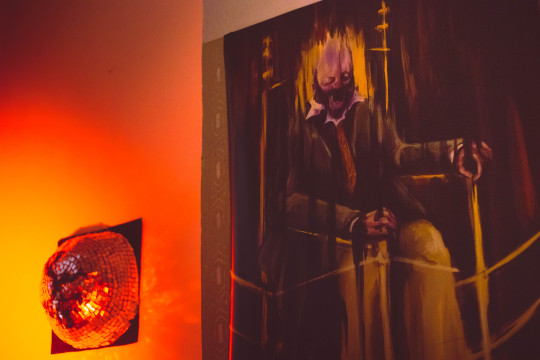

I can't possibly describe what it was like to inhabit the rundown tenement of La Cage with more than a hundred other players, bringing to life a whole slice of society: immigrants, barflies, petanque players, sewer people, Union gang members, Wild Pines mercs, disco people, sewer people, looters, street artists, an inevitable mass of fascists, anarchists, communards (or so I'm told), communards (proper), communards (it's complicated), councilmembers, hustlers, taxidermy enthusiasts, the also-inevitable mass of pale-fried strugglers, journalists, Moralintern creeps, RCM chucklefucks, and so on and so forth. The old military hospital burst to life with small human moments and grand revelations happening in every corner at all time, as the gears of history moved toward our inevitable trial run of Le Retour.
We really had it all. Politics, drugs, creeping mold, more drugs, unseen voices steering us toward our best and worst natures, a metaphysical rave, entroponetic anomalies, precognition (scripted), precognition (just kind of happened?? Several times over?), suzerainist coffin deliveries, sweatshop politics, old reckonings, radiant sacrifices (accidental-ish), three-way divorces (one-upping one HDB), strikes and strike-breakers, political dance-offs and political orgies, and did I mention the drugs, under the greatness of history and the pale.
Thanks to the organizers for the colossal effort they pulled off like it was nbd, and to all my fellow dwellers of La Cage.
A few favourites:
First off, this was basically the entirety of my game:
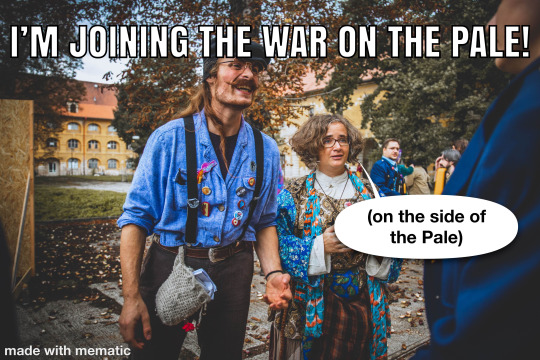
...with a central heartrending tension between that abandon, that 'something beautiful is going to happen', and my character's earthly loves, the family she loved so much. It was really really fascinating and emotionally moving to get to play out that central conundrum in full (and go die on the barricades for an independent Revachol following the push of History) (and also of Franconegro pulling my strings like a marionette in a chilling scene) (but mostly History)
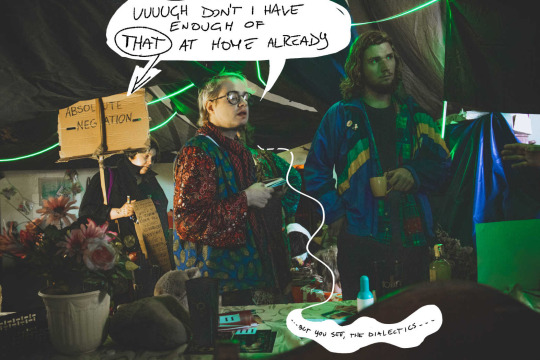
Case in point: me in the back, the Unseen voice/spirit/skill "Doomsayer" to the left, dear husband Tai in the middle. Sorry Tai!
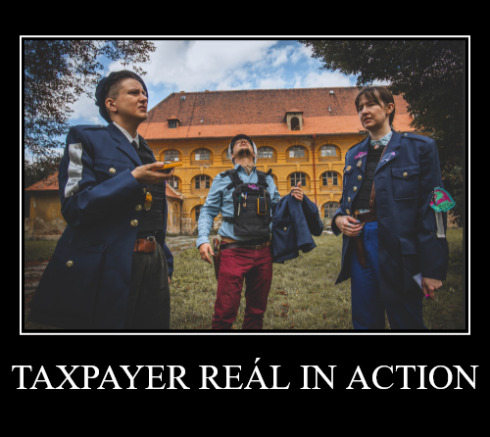
Moralintern mission

Sweatshop workers strike
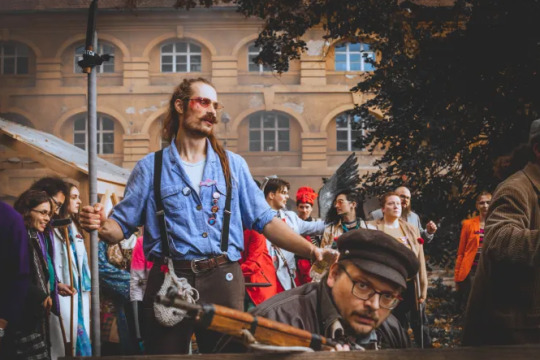
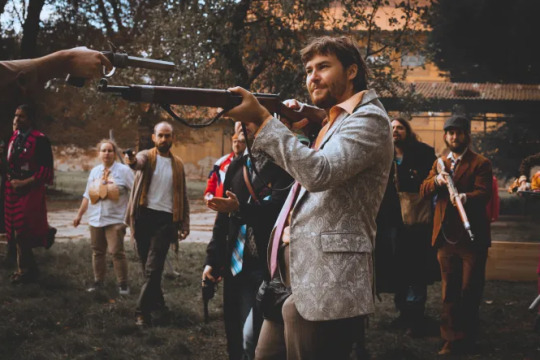
Both sides of the barricades, right as the game ended (this is not a spoiler, it said up front on the website that that's where the story would end): independentists (feat. His Fuckery Franconegro with the black wings in the background, but also the Unseen of if it sucks hit da bricks, the street martyr and idk who else) and globalists (Dolores Dei, Doomsayer et al)
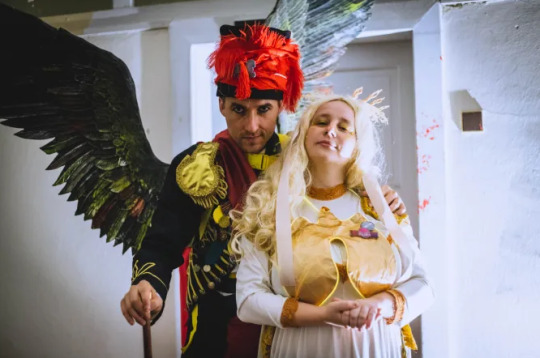
speaking of those two - here's them in full rave regalia. I love that two of the collective skills of this place are flat-out "Dolores Dei" and "Franconegro", it's so fitting. Can't have current society without them, so here they are, as a molecular part of it.

RCM peeps predictably being serious, professional individuals

Designer drug guy talking to Corrosion who's kind of the local version of Electrochemistry. I'm sure this was a completely hinged conversation that reached sensible conclusions
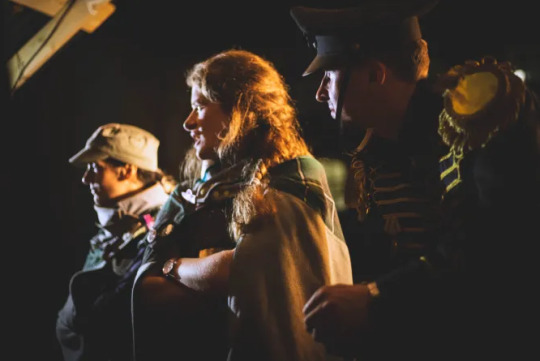
Wild Pines mercs +1
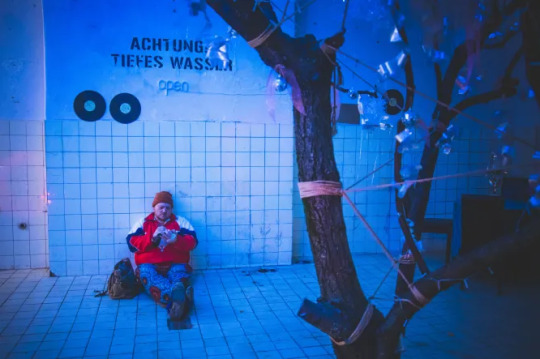
Disco downtime. The set design for The Bearded Vulture club and The Second Club was out of this world. I hope my own pics can convey some of it.

sweatshop power dynamics (there were accidents, Union leverage, strikes, corruption... you'd think there would be barely time for anything else to go on AND YET)
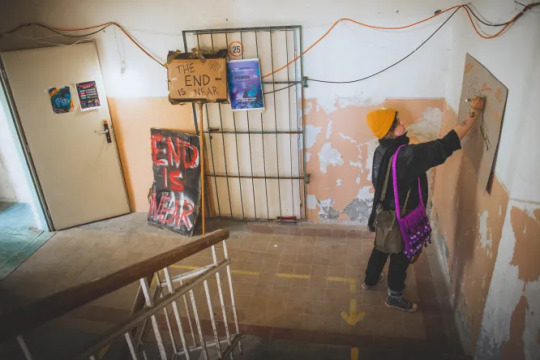
possibly my fave pic of the whole thing (go Doomsayer!!!). we had specific graffitable areas on the wall and made VERY good use of them. Well, everyone else. My character wasn't much of a graffiti artist, her greatest contribution was turning "Revachol for revacholians" into "Revachol for mold"...

LARP^2
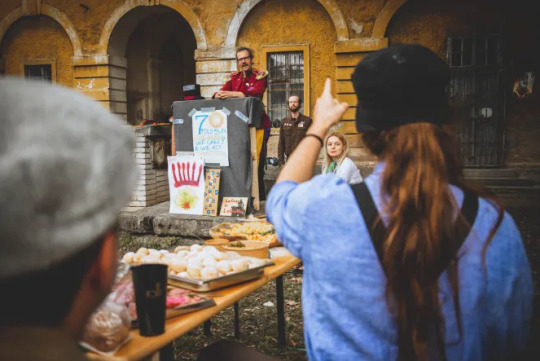
fascist campaigning at the Democracy Picnic

Petanque club...

...actually playing petanque? I never saw them ingame, I was starting to wonder if it wasn't a front for something else
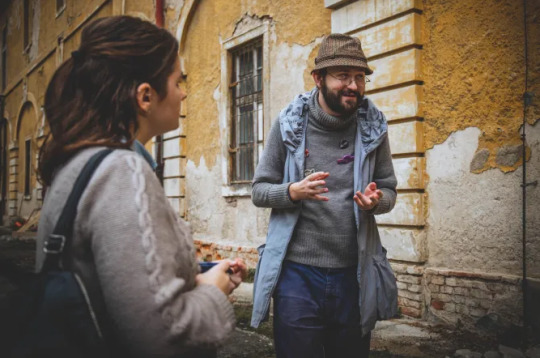
Pictured - no scheming, plotting or quadruple-crossing here as you can clearly see by "Kras Knezhinisky"'s super normal demeanour and unassuming name, which I can totally believe was on his legit birth certificate)
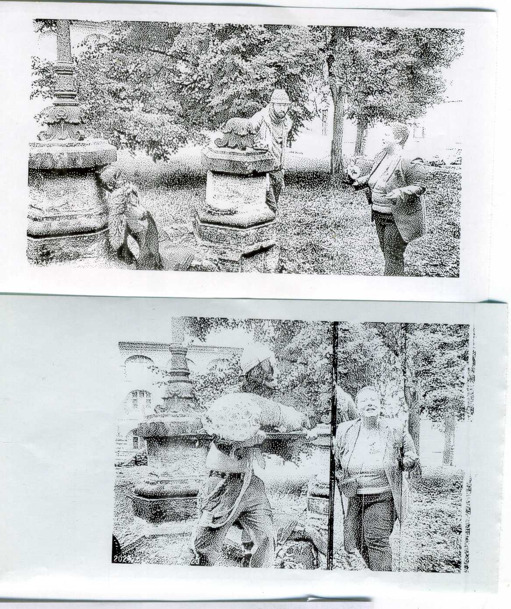
I mention Kras because here's the theatrical taxidermy show with him in the middle narrating the adventures of his antifascist ferret Kommissar Kunixet. Nice pic, I take the shot. Five seconds later, superstar Frittte clerk Jamie Delaney joins in, and what can I do, NOT have Jamie in a shot? Absolutely not, so I take the same exact shot with Jamie in it as well.
And by sheer twist of technology (and of course the pale, and of course vile censorship in defiance of the Romangorod convention)... Kras Knezhinsky of all people gets kommissar-no-kommissar'd. "Kras, the pale is erasing you from our memories, from images," I warn him, showing him the two pictures. One hour later, he gets taken behind the waste disposal facility and shot.
Hm.
(LARP's haunted. These things KEPT HAPPENING. In the first run, that version of my character went "YOU MURDERER" at the specific merc who'd turn out to be connected with her background, a couple of hours before getting that reveal in-game. What's Elysium without some good old-fashioned precognition after all!)
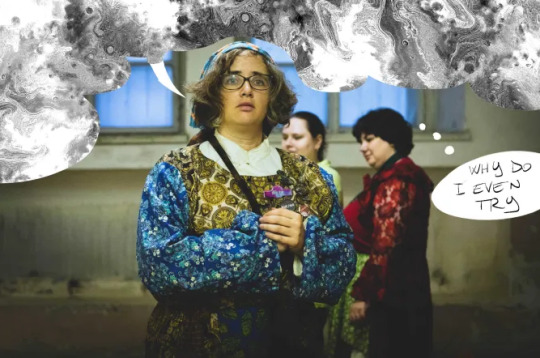
Poor Flowerseller (red dress here) was kind of my Empathy - many valiant attemps were made, however. Uphill struggle.
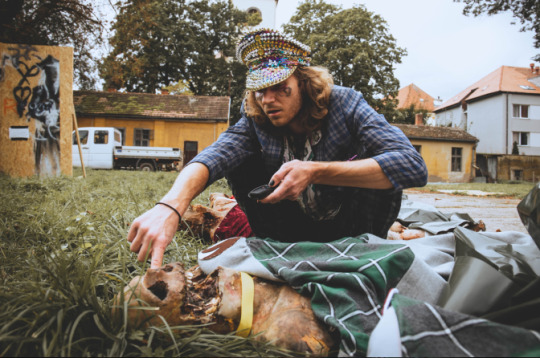
HARDCORE anodic club leader Konrad Nilsen doing something not so hardcore here, idk what was going on exactly but then again I never even noticed we had a morgue and I had a plot right next room, so what do I know. I know that the end is near. That much for sure. And that the resolution of history's contradictions goes through the pale. But corpses? Nah.
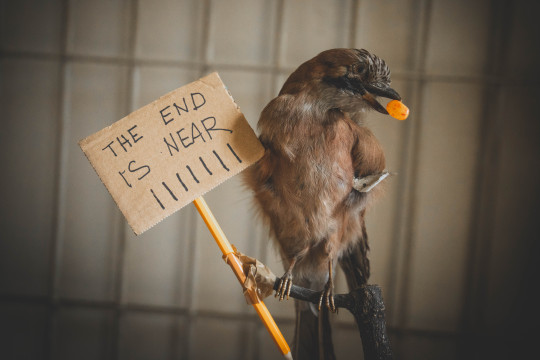
||||||| 😎
153 notes
·
View notes
Text
breaking down over in stars and time's use of tarot cards
[woe, spoilers be upon ye!]
[no seriously, this contains spoilers for the entire game. proceed with caution]
BECAUSE IF I HAVE TO BE TORMENTED BY THIS KNOWLEDGE, THEN SO DO YOU.
Act 2
Six of Swords
Transition, change, rite of passage, releasing baggage
Siffrin is, in the start of Act 2, beginning a new journey. This card is pretty self explanatory, but also is a form of major foreshadowing. Six of Swords has a heavy implication towards evolving and bettering yourself as a person, going on a journey that is absolutely essential to growth. Whether or not this journey is at all pleasant is entirely left up in the air, but given the rest of the game, it’s more of an indication of hard-won lessons.
Siffrin asks “How does the boat not sink?”, which is kind of hilarious, given that they end up almost sinking into complete despair by the end of the game, only saved by getting help and changing, completing their journey and starting a new one.
The Star (Reversed)
Lack of faith, despair, self-trust, disconnection
Stars play a huge part in this game (it’s literally in the name), so this card felt kind of inevitable. The most important part of this card is that it serves as a sort of omen for what is to come. In Act 2, Siffrin is blissfully unaware of the overall impact this will have on his psyche, of the turmoil it will bring him. But the most important part of this card for me is the idea of loss of faith. The very first line in the reference site’s description is this; “The Star Reversed can mean that you’ve lost faith and hope in the Universe”. This is likely indicative of the gradual crumbling of Siffrin’s hope over the course of the game. The site also notes that “You may be desperately calling out to the Universe to give you some reprieve but struggling to see how the Divine is on your side”. Siffrin pretty much does this in the latter half of Act 3, as things become more and more hopeless. This is, for lack of a better term, a test of faith. Given how the Change God mocks Siffrin for the Universe never talking to them directly, this is nailed home pretty hard. But, in Act 2, a lot of the concept of The Universe and Wishcraft isn’t introduced, so this serves more as a premonition than anything else.
Another note: Loop. Loop is a star. Or ate a star. Either way, they have a deep connection with stars (and The Universe as a result). I bring this up because of the general meaning behind the UPRIGHT version of this card, which is a sign of hope, faith, and guidance. Loop serves this purpose throughout the game as Siffrin’s “helpful companion~”, so the connection here there is nice. But the entry states this; “When confronted with a challenging situation, you can either crumble like The Tower or stand firm in your conviction that the Divine is everywhere”. Because of the 2 Hats situation, we know that where Siffrin eventually overcame the challenges of The Star/The Universe, Loop did not. Instead, they made one last plea to the Universe for help, and The Universe listened. But we know the obvious twist of fate here is that Loop is literally helping themself by helping Siffrin. They gave in, crumbled, and lost their faith in the end, only to be the thing that helped Siffrin keep theirs and eventually free themselves.
Ace of Wands
Inspiration, new opportunities, growth, potential
Most of Act 2 Siffrin is spent with this idea in mind. At this point, Siffrin is pretty lax about the true meaning of the loops, believing them to be an opportunity to beat the king, each loop full of potential to achieve their goal. But the twist here is that for the Ace of Wands, there is always potential but never a guarantee of success. Siffrin experiences this first hand at the end of Act 2.
Eight of Pentacles
Apprenticeship, repetitive tasks, mastery, skill development
Another nod to Siffrin’s frame of mind in Act 2. The slow mastery gained through the overall leveling system in the game actually accomplishes this card’s meaning pretty well- you repeat everything, over and over, and it is only when you master it that you are able to defeat the king. Siffrin notes a lot that in a couple of loops, he will likely be able to remember interactions by heart, and some he actually does recall completely, like when the very first interaction with Mirabelle in Dormont at the start of each loop. He’s essentially memorized the script, mastered the actions, the choreography, and now is faced with the fact that he has to do it over and over again. It will turn into monotony by proxy of being so familiar and easy.
Siffrin also notes that “they seem happy to be working”, which is another nod to how he sees the loops towards the start of the game, less of a curse and more of a boon that requires effort to properly utilize.
Act 3
Two of Swords
Difficult decisions, weighing up options, an impasse, avoidance
There are a lot of hard choices to be made in Act 3, so this likely isn’t referring to any one instance. This is where the Eight of Pentacles card comes back into play, in a sense- there is still more to learn here, more to master, but a lot of that requires decisions that have greater weight than those in Act 2. People’s lives are at stake. However, it is only by doing this and making hard choices that Siffrin eventually learns more about Wishcraft and the way things work in the loops.
Interestingly, when Siffrin describes this card, they describe someone holding scissors. An intersection of 2 blades, but the thing here is that no matter which side you’re on, they can still cut you. Alternatively, this could just be a representation that Siffrin, who is the main Scissors Craft user of the party, is the one stuck with these decisions.
Six of Pentacles (Reversed)
Self-care, unpaid debts, one-sided charity
Siffrin is the king of never giving themself proper self care. They are also the king of tearing themselves apart to give everything they have to the party. They are willing to sacrifice everything they have for a “perfect ending” where everyone is happy… everyone but themselves, that is, because they do not receive the same fulfillment in return. They give and they give and they give, but the party does not give in return, not in the way they need. Not soon enough to prevent them from falling apart at the seams over it.
The note here mentions that it shows “someone walking on the sky and offering flowers to sky people”, but then when flipped shows “the man is touching the ground, and giving flowers to normal people”. This kind of struck me as strange, as no matter what orientation the card takes, they will always have their feet on the ground. This also isn’t the last mention of sky people, but I haven’t really delved deep enough into theories about that to understand what that really means in the context of this card.
The Hermit
Soul-searching, introspection, being alone, inner guidance
Hilariously, this is something Siffrin completely lacks for most of the game. They avoid thinking about themselves and their own sense of self for a vast majority of their character arc, and it isolates them. While this card means well in its message of introspection, it’s also key to note that this withdrawal from the outside also can lead to being alone with your own thoughts, something that Siffrin experiences more as the game continues. And their refusal to acknowledge what they want almost breaks them.
The loneliness aspect of this card is further hammered home by the fact that Siffrin says “they look sad and alone”.
Five of Wands
Conflict, disagreements, competition, tension, diversity
Misunderstandings and miscommunication is at the heart of this card. And oh boy, does Siffrin deal with a LOT of that in the loops. My brain immediately goes to the whole “touch therapy” arc and Siffrin’s refusal to clarify that they don’t dislike touch, which eventually leads to Memory of Touch. It’s also a bit of foreshadowing of what is to come, especially in Act 5 and the breakdown of the party’s trust in Siffrin because of their break in communication and understanding with each other.
Siffrin asks “Why are they fighting?” when this card is drawn. The answer is that they don’t really understand themselves. This is conflict driven by a lack of communication and understanding of the other parties at hand. As the description for this card says, “No one is listening.”.
Act 4
Eight of Swords
Negative thoughts, self-imposed restriction, imprisonment, victim mentality
Act 4 starts with Siffrin experiencing quite possibly one of the worst endings to the loops he can imagine, so it’s safe to say that at this point, their deterioration is rapidly worsening. They begin to spiral, and the idea that there is no way out begins to appear. However, the main crux of this card’s significance is that there is a way out, but it lies in freeing oneself. There is a gap in the swords, and if one was to take off the blindfold they could get out. The description of this card calls this “imprisonment”, which ties in pretty nicely to one of the screens you can get when you loop back; “You are in a prison of your own making”. The description for the card also reads “You surrendered your power to an external entity, allowing yourself to become trapped and limited in some way. You may feel that it isn’t your fault – you have been placed here against your will”. This is heavy foreshadowing for the idea that Siffrin’s own wish to The Universe that got them trapped in the loops, not the wishes of The House or The King.
Siffrin asks “Why is he alone?” when drawing this card, which kind of projects onto themselves. They feel alone, they feel trapped, and they believe that there is no one who can help them, but that isn’t true. They have the ability to change things, but they are afraid.
Ten of Swords (Reversed)
Recovery, regeneration, resisting an inevitable end
There are good aspects to this card, but the main focus in this case is likely the idea of resisting the inevitable. This is pretty much what the whole deal with the Head Housemaiden is, the repeated attempts to find some way to change something that, by the nature of the wish, cannot be changed. And yet, Siffrin is unable to let go of this. It’s also noted that this card represents past trauma that is still being carried around and still hurts the bearer. Siffrin spends this Act searching into their past, tearing up painful memories (or lack thereof) in the process. They carry the burden of being without a true geographical/cultural home to go back to. They cannot let go of this, nor do they want to. But the card’s description notes that “these old pains need to be dealt with once and for all. It may be difficult to delve back in, but it's the only way to release yourself of this pain and allow it to pass from your life”. In a lot of ways, this nods to the avoidance of pain that Siffrin displays when they are unable to cope with their trauma from the past and the loops. It is only through promising to tell the party their wish and deal with the pain and fear of their trauma that they can move on and begin to heal. This card pretty much represents the whole crux of the story’s meaning.
Five of Pentacles
Financial loss, poverty, lack mindset, isolation, worry
Loss is a major theme of Act 5. The loss of memories, the loss of a home, the loss of faith, and, perhaps most importantly, the loss of hope. The card’s description says “You no longer feel safe because it has all been stripped away from you in one blow”, and this is pretty much what happens. Siffrin is in a crisis. They are exhausted, they are alone, and they are profoundly terrified of what that means. At this point, they are searching for help desperately, but are unable to ask for it. This card explicitly deals with fear of rejection and reaching out for help- the situation is dire, but, as seen with the card’s depiction of lit church windows, there is help nearby. The issue is that one must be willing to accept it. There is fear that you may lose something important- in Siffrin’s case, his found family- but there is no telling if that will actually come to pass.
To further nail the loneliness aspect of this card home, Siffrin says that the figures on the card “probably don't have any friends”, something he starts to believe in the latter loops as the group loses their identities to the script. The in-game card also is different from the real card, and is said to show empty glasses, a pretty on-the-nose reference to Siffrin’s “glass half empty” mentality as they lose hope later in the game.
The Hanged Man
Pause, surrender, letting go, new perspectives
The Hanged Man gets a pretty bad reputation if you don’t really understand what it means. It’s a card about acceptance, pausing, and entering a new phase in life. But this change is heavily implied to come via unfavorable circumstances, situations outside of one’s control. The description says that when a person is unable to pause when they need to, unable to stop their actions, “The Universe will probably put things on hold for you, in the form of continued obstacles, ill-health, and breakdowns”. And this is pretty much what happens in Act 5. Siffrin is ground to a screeching halt by their own body, exhausted, starving, and mentally/physically fatigued to the point of actual sickness. On the topic of “surrender” and “giving in”, things get more pointed. Siffrin gives in to Mal Du Pays (very ‘L'appel du Vide” style), almost dying as a result, but then conversely gives in to the party’s urges to tell them what they wished for, to let go of their fear and stop looping.
Siffrin notes that the Hanged Man “Look(s) like they're about to die, but they're smiling”. This is more of a connection to the end decision of Siffrin to let go of the loops and tell the party about their fears. They are facing down something that they are terrified of, something seemingly insurmountable, but rather than continue to fight and avoid letting go like Loop did, he instead chooses to surrender and tell the party.
Act 5/6
The Fool
Beginnings, innocence, spontaneity, a free spirit
There are two versions of The Fool, technically. In Act 5, if you take the card and inspect it immediately, Siffrin will give a manic laugh and tear it to pieces. In a lot of initial interpretations of the card, some people will assume The Fool to be what the card says they are- a fool, someone stupid and tricked and hopeless, about to send themselves to their doom. But the reality is that this card is not really about that- it’s about new beginnings and the start of a new journey, but specifically through a leap of faith- a leap of faith that Siffrin has to take at the end of Act 5. While he is going through The House during this act, however, he is unwilling to accept this advice, either because it is misinterpreted or consciously, and instead tears it apart.
When the card is examined after the game, rather than during the final loop, Siffrin seems to recognize the card for what it actually means. He says “It's a traveler. He seems to be starting a new journey”. Siffrin’s title in the Profiles is literally “The Traveler” (alongside having the Traveler’s Hat), so this is a direct statement of new beginnings for the party and Siffrin’s life, a new journey they are taking with their family rather than alone.
-
annnnd that does it for me, i've spent no less than two hours writing and researching for this post so ima go take a nap now, gnight

#in stars and time#isat#just chatting#liveblogging#in stars and time spoilers#isat spoilers#tarot reading#tarot cards#dear god this post had me locked in a chokehold the entire time#im so tired#worth it though#insertdisc5 you are a genius and you have all my respect you absolute mad lad#wormwood rambles
209 notes
·
View notes
Text
Ok. I’ve been compiling my thoughts on the pathologic 2 endings for a while now, and I’ve finally pinpointed my feelings on them (enough to share at least). I’m desperate to hear what others think about them too.
Lengthy Kin-themed rant oncoming? Perhaps.
More under the cut.
CW: Spoilers for Pathologic 2 (of course).
- - -
To preface: As I am Māori, not Buryat or of the other cultures I have heard the Kin to be based on, my perspective is more from *my* understanding of what it means to be Indigenous than anything else. There are probably many things I’m missing. But I’d like to throw in my two cents, however relevant they are.
Suffice to say, my feelings are complicated. Stylistically and narratively, there was a lot that I enjoyed. From a reconnecting/ mixed Indigenous perspective, however, I still feel unwillingly bisected, torn.
At the culmination of everything, Artemy Burakh and the player are roped into a cruel, two-pronged choice. Destroy the Polyhedron along with the miracles of the Steppe, or let the plague devour the town as you lead the Kin back to its heart. In these scenarios, you either assimilate the Kin into the town, which many of them will despise you for, or push out the nonindigenous townsfolk by force, letting nature run its course. Any third option has already been amputated, beyond your will. You cannot protect the Kin completely either way, some will likely die from the plague in the latter, and the more fantastical will in the first, by being cleaved from the earth’s dying magic.
Diurnal, or Nocturnal. No matter how you look at it, the kin cannot thrive in either. For it to be a choice at all, hurt, to say the least. After playing the bachelor’s route in the first game, I’m sure that was deliberate in an anti-utopian sense, perfection is impossible etc, etc. But the first lens I saw it through, stuck with me.
When I initially read Isidor say this after Artemy’s trial in the abattoir:
“Facing the Future is the way of Love. Facing the Past is the way of Love. But the two are incompatible, and it broke my heart.”
I was devastated. The hopeless dichotomisation of future and past… and I could only construe it as assimilation or death in some manner (but I could not see what role it took yet). That feeling festered for a while, but I wanted to see it from another angle. I think it's natural to be sensitive to the words “progress” (which is usually linked to “civilisation” and colonisation) when anchored against Indigenous culture, but I didn’t want that to blind me completely.
On its own, I do like this line. It’s weighty. And I think it articulates aspects of Indigenous struggle well, to some degree. Going back to the “past” is somewhat impossible for many reasons. Decolonisation is needed but I don’t believe it means restoring the “past” fully by any means. Culture is not stagnant, and neither is the future. To say they are incompatible though pains me. Especially when contextualised inside the divide between the kin and the town. It is an intentionally agonising line, and successfully so. Pitting the themes of Past/Future, against, Kin/Town, is something I find hard to reconcile with. Even just the first part irks me; personally the past walks with me at every step, the future is void and useless without it in full view. But I wouldn’t say a line from Isidor (or Artemy’s subconscious) necessarily defines the game more than it does his perspective. For me, it is the patterns that follow and precede it.
Aspity is a very obvious portrayal of what it looks like to “face the past” completely. Visiting her sanctuary, It becomes very evident that her opinions of the non-Kinfolk sway towards genocidal. They must “flood the town”, as she put it. Considering their treatment on the Bull Project and well… everything else, It’s not unfounded. During the night visits, we develop a growing understanding of what is at stake for the kin. Their language, legends, arts, and traditions, and too many Kin are dying from pest and persecution (Its a familiar story). Herb brides are forced to sell their cultural dance to get by (another familiar story for Māori, kapa haka and tourism, our culture has also become a commodity out of necessity). Legends like the shabnak adyr too are warped by the townsfolk (as it is used as an excuse to target Kin women). Assimilation means these things for them too.
There's also the case of how the Kin are depicted as more animalistic than the “more human” townsfolk. Oyun, Big Vlad, and even Artemy have a long history referring to them as such. To make the Kin less than human is inherently othering (as is any case where the empire views us as inherently more primitive or unevolved). The importance placed on Aurochs and being one with nature in Kin culture paints this in a less hostile light (Big Vlad’s view not so much). But I fear the effect this might have on player perceptions of the Kin will be negative regardless. I’ve seen a few statements about the Kin being a “hivemind”, I can't say I entirely agree. Many are divided on how they view Artemy, as well as what they desire for the future. I’ve also seen this in reference to when a few odonghe gift you organs for your tinctures, but at this point everyone in the town is desperate for a cure no matter the cost. Their more violent practices appear to weaken many fans' empathy for the Kin, painting the Nocturnal ending darker and darker. Getting rid of herb bride “marriages” would be a good thing at least right? Assimilation might be a good thing then? Nothing good comes without cost, and for the Kin this cost is too steep. Survival doesn't have to mean losing yourself piece by piece.
I will say that despite liking the non-Kin townsfolk, I do wish there was a larger Kin presence among the main roles. While we have Nara, Aspity, Oyun, and Taya, I understand how their presence does little to assuage the dread of seeing the rest of the cast wade out into the Steppe. For me, seeing Murky and Sticky in such a lost state during the Nocturnal ending, made me unable to see it as anything but a mistake.
Two other alternating themes are present through the endings. Childhood (miracles and dreams) and adulthood (waking up and walking forward). The dominant presence of children in Nocturnal, and the fact that walking through the near empty town really does feel like a nightmare, showcases this. The impossible has been made possible, the earth sleeps, sated. The endless cycle of responsibility, from father to son, from parent to child... Children rule the future here. In Diurnal, this cycle, at least, has some room to be broken. Responsibilities are weighed more evenly. Letting go of miracles and childhood dreams, that is the only future in this end. I’m not sure If i have to discuss how problematic it might be to place indigenous revival in the realm of childishness, and assimilation in the realm of growing up, but i thought i'd leave the notion there regardless.
Leaving how you view the two ends aside, it's obvious that Nocturnal has a heavier, gloomier tone.
Maybe having a third ending would’ve been reductive, to have one person so easily find a solution to unifying the town. But, it hurts so deeply to have that choice wrenched from your hands. The choice might have been severed by Isidor, but it felt like so much was possible for Artemy. With one foot in both worlds, the potential of true reconnection, i thought we could move past what was possible for his father. It felt like that was the direction Artemy was moving in, seeing the choices before him and bullheadedly trampling through the middle. Just like he did with the cure, finding the impossible connection.
As it stands, the endings are brutal. Survival for the kin is held by a thread, regardless of the direction you look. They either die a physical death, or a cultural and spiritual one (the two could very well be interpreted as present in both depending on how you look at it). By your conversations with Aspity, even if they survive, the Diurnal end is hinted to lead to an essential “dissolution” of the Kin as they know it. Wherein the differences between the Town and Kin will become so negligible that the two are no longer distinct. Which from my perspective is its own, however voiceless tragedy.
Ok, that was a lot of negativity but I’d like to be candid. Even despite all that, Pathologic is still one of my favourite games of all time. I saw someone say on here that Pathologic 2 is most interesting when allowing the player to decide where love takes them (even if they are led to extremes). Love being at the forefront, regardless of the choices you make, no wrong answers, that's what I appreciated most when playing as Artemy. Whether you chose to kill the three odonghe for Rubin, begged him to stay despite everything, killed Oyun, the Oglimskys, or the pest, it was for the love of something. The internal strife of having a mixed identity too, the rejection and affection from both sides, is something I related to even if the circumstances were miles apart from my own. I wish that Nocturnal aligned with that energy, that the nuances there were a little less stark. That opposing assimilation felt like less of a mistake.
There's a lot more I could delve into but this is pretty long already. This post could all read like nonsense/surface level, but I’m curious to see what other people think! Especially other indigenous folk, I’m dying to know how others interpreted the endings regarding the Kin.
#I'm sure there are definitely way more themes I haven't discussed/thought of#I’m also yet to finish Artemy and Claras routes in classic HD so my thoughts are obviously less contextualised#but i couldn't wait any longer#Ok I need to get back to my thesis now fr someone chastise me#pathologic#pathologic 2#pathologic 2 endings#criticism#txt
152 notes
·
View notes
Text
Brodoroki's Big-Ass Post of Apollo Character/Plot Headcanons
because I said I was gonna do it, and by god i'm going to commit. and commit I did. this is 1.7k words long. on-brand for me tbh
I'll probably make a subpage of my blog to post this in a... more refined manner? I'll definitely do as much for my RP blogs. But having it as a post is nice too.
I will note that a lot of these things have barely any backing canonically. It's just what I've come up with over the years. Additionally this is subject to change or gain additions.
ALSO spoilers for all of AA456.
PLOT-RELATED HEADCANONS:
Pre-AA4
Thanks to him being sent to America on his lonesome, as well as his own eventual assumptions regarding the situation, Apollo has fairly intense problems related to being abandoned by, separated from, or otherwise losing people he is close to.
Partially due to this, those that he comes to see as role models often gain a sort of parental status to him, maybe a little more quickly than they should.
He has problems making new friends, thanks to how prickly and focused on his own things he tends to be.
Clay was his only friend, pretty much up until he was hired into the WAA. (yess i know capcom just doesn't care to mention the other ones he probably had but I chose to imagine it this way)
Clay is also the only person he willingly spoke with about his past in Khura'in. Due to this, he was also the one to help him through adjusting to America, on a language/accent/cultural basis.
Apollo is likely at least decent acquaintances with Clay's father, but isn't that close. They're at least on good terms.
Figured out how the bracelet worked much earlier than implied in the games. Has a rather deep curiosity regarding the object's origins (much stronger than the curiosity regarding the identity of his biological parents).
He can take his bracelet off, it just requires at least one person to help him pull it off.
AA4
Because of the parental thing noted above, Apollo saw Kristoph as at least a father-adjacent figure, up until his arrest... but the familial connection wasn't something he could completely get rid of. So, up until whenever Kristoph is executed (assuming that ever happens), Apollo visits and speaks to him in prison. Phoenix is never told about this, nor is anyone else. Even Clay wasn't aware.
He had a much brighter and cheerfully energetic personality prior to his first trial, but the brutal reality of everything that happened on that day turned him a bit bitter. He does still show that side of himself sometimes, but only rarely.
After Turnabout Corner, the Kitakis and Apollo (and the WAA in general) stay on good terms. Wocky assumes he and Apollo are great friends, though Apollo probably thinks less... Anyways, the office often receives gifts of baked goods from their bakery, due to this.
While Apollo did consider Phoenix to be a sort of parental figure fairly quickly, him being a cryptic asshole for the entirety of the game was not lost on him. At least until the start of AA6, his feelings on the man remain mixed, though he refuses to talk to him on the matter.
He is, however, at least happy to be part of some sort of family unit.
Since Apollo really had no guardian of sorts, Kristoph had been listed on many of his emergency contact forms. Thanks to a mix of not immediately liking Phoenix and forgetfulness, Apollo never really ended up changing it. Of course, since having a contact in prison doesn't really work... his contact, unbeknownst to anyone involved, has defaulted to, of course... Klavier.
AA5
Phoenix's attitude change was initially met with extreme distrust by Apollo, which wasn't helped by the sudden appearance of Athena (whom Wright had apparently been working with for a while now). Apollo and Athena likely talked about it at least once after the latter sensed the annoyance in his voice and cornered him about it.
Even though it's implied that no one met Clay before his death, Apollo likely introduced him to everyone at least once, with the guy maybe occasionally stopping in to the WAA.
Took off from work (the first time in months) to watch the rocket launch. Which ended up, of course, being a rather poor idea.
Since he's basically alone, couldn't take his bracelet off (see note in pre-AA4). Hence, eye bandage. He likely figured out the silly depth perception (?) thing by accident at some point, so knew that was his only option.
Aura likely pulled him aside while he was investigating to speak about the case, slowly easing into his opinion regarding Athena. They continued to occasionally speak over the next few days, meeting every time Apollo visited the space center.
Prevented himself from grieving at all before everything was over. Barely let himself rest as he didn't want to give himself any time to think about it.
As the bombing happened, Apollo was standing with his back to the explosion, though was thrown on top of Juniper as a result of the blast. His injuries included various burns and flesh wounds (shown below), as well as internal bruising, general bruising, and possible fractures/contusions.

(ignore the jank anatomy. all i meant for that to be was a diagram ngl)
Spent about half the day in the hospital before getting himself (against everyone's wishes) discharged early. He was absolutely in an excessive amount of pain, but as with his grief, he refused to let himself deal with it until everything was over.
Getting knocked out the following day gave him a concussion. It made his memories of the preceding days murky at best, as well as causing him to act with more irritability and less focus.
He was put in the hospital again, of course. By evening, he was out once more.
At the end of his testimony in Turnabout for Tomorrow, when Phoenix finally proves that Athena absolutely did not kill Clay/that the culprit is Fakebright, Apollo relaxes, gives a very genuine thanks to his boss, before collapsing at the stand. He reached his goal, after all, and let himself give in to all the pain and exhaustion he felt... while scaring the shit out of everyone in the courtroom.
His bandages stay on for the next two months, to some degree. For at least the next month, Phoenix just about forces him to take a vacation, with even a (probably not serious) threat to fire him if he finds out he's doing any work.
Sort of assumes everyone in the WAA hates him for a bit after the game ends.
Apollo grows closer to Klavier after the game ends, wanting a friend to fill the hole that Clay left who also isn't a WAA member. Whether their relationship is entirely friend-level or romantic-level depends on my thoughts at the time... but they are at least good friends who meet once a week to talk over things.
As an extension of this, Apollo may at some point speak to Klaiver regarding his past in Khura'in, just needing someone to speak about it with.
Speaking of his past, Apollo briefly gets incredibly hopeful/desperate for Dhurke to show up after the end of the game. With Clay gone, he longs for the man who raised him, to just spill his guts about all his issues, to be comforted fully. He feels awkward thinking about talking to Phoenix on a personal level, and he doesn't want to break down in front of his closest non-coworker friend (Klavier). Of course, this never happens, and Apollo soon grows bitter regarding his past once more.
Scars from the bombing cover his arms and some other spots. Prefers long sleeves afterwards, as he doesn't like to look at them or explain them.
AA6
Apollo still keeps up with news regarding Khura'in, just barely. He also practices writing and speaking the related language, enough to stay fairly fluent.
At least one keepsake from the country was also kept, even though Dhurke hadn't been fond of the idea. While still bitter about his whole situation, Apollo has kept it safe this entire time. Not sure what exactly it is, but it's likely something deeply personal. Maybe a little craft or carved figure Dhurke gave him? An eagle, maybe, since I've implied that's one of his favorite animals.
Athena and Trucy likely picked up Apollo's prickly-ness regarding Khura'in at least once, though he always refuses to explain himself. While they stop asking after a certain point, they're definitely curious.
This curiosity becomes much stronger after the incredibly suspect behavior of both him and Nahyuta during the Magical Turnabout. Both men absolutely had odd tics and tones to their voices while speaking to one another during the trial, and with the ladies being both the co-counsel and defendant, they'd get a front-row seat to it all.
Given the comments Apollo & Nahyuta make to one another at the end of the trial, along with everything else, they can assume the two were very close at some point in time, early in life. Athena and Trucy likely talk in private to speculate on this (and might drag Phoenix or even Blackquill into the conversation).
While the games leave it pretty vague, I do think Apollo genuinely considers Nahyuta and Dhurke (and sort of Datz, in a weird uncle sort of way) to be family. Vice versa, as well. While Dhurke's death leaves him devastated, he's happy to be in contact with the two others, as well.
Building upon something mentioned above, even though they really barely talk about it in-game, the occurrence of Dhurke Dying not even a year after Clay leaves him in shambles. After the decision to stay in Khura'in, he quickly starts to regret his decision, breaking down in front of Nahyuta after the latter checks on him, when he doesn't leave his room for an entire day. They have a very long, serious but heartfelt talk about both of their lives, and their hardships, and everything. It lasts hours, and is emotionally taxing on the both of them, but leaves them more accepting of everything that has happened as of late.
Actually remembers when that one photograph of him, Dhurke and Nahyuta was taken, even if barely. It was the first time he had seen a camera, at least a modern one.
MSC. HEADCANONS
Likes spicy food.
Knows a few low level magic tricks, thanks to Trucy teaching him.
Would rather be busy than idle. Troubling thoughts bother him more when he has nothing to do. Thanks to this, he didn't mind offhandedly doing chores around the WAA... but he started to get annoyed when people started to expect such a thing from him 24/7.
Favorite season is fall. Summer is a close second.
Frequently gets too little sleep, though it doesn't seem to adversely affect him...
...though it does make him prone to napping in odd places.
Doesn't like coffee. If he's drinking anything, it's tea.
Low tolerance to alcohol. Barely drinks it anyways.
Favorite animal is some sort of eagle or hawk.
Okay at cooking.
Bi, demiromantic. Never has been in a relationship before the games.
#note to self please for the love of god link this somewhere i didn't write all these words for nothing#ace attorney#apollo justice#dual destinies#spirit of justice#apollo justice ace attorney#aa456#ajaa spoilers#aa5 spoilers#aa6 spoilers#1.7k words and its a fucking bullet list im wheezing#again. on brand for me but come on#brodoroki apollo headcanons
54 notes
·
View notes
Text
Trouble in Gambler's Paradise

What's this? We actually got a little bit of political intrigue in Nightbringer Lessons 51 + 52 amid all the usual shenanigans? In our OM?! It's...not as likely as we wish, but we did get some!
(spoilers for NB Lessons 51 and 52 below the cut)
A quick recap: Our entire cast is going to Meowcao to fulfill Mammon's wish after he won in the RAD Science Fair for Devildom Geography. They have the entire town reserved for three days thanks to Diavolo, as he is a major shareholder for the Three-Legged Crow Group, which powers most of the technology in Meowcao. Him being the Demon Prince is probably also part of it, though what we find out makes this all the more interesting.
MC, the brothers, and the Purgatory Hall gang all arrive in Meowcao and end up getting roped into a game -- they have to gamble their souls. While that sounds about right for the Devildom, it's quickly made clear that this is an unusual request and we're now in danger.
For once, this particular situation is not due to some curse but happens because Meowcao is actually home to a considerable number of demons that oppose the Demon King. We find this out from Diavolo himself as he travels with Barbatos, Thirteen, and Mephistopheles to catch up with the others in Meowcao.

Thirteen and Mephistopheles point out that this makes the trip open to danger, and sure enough, none of them can get in contact with the rest of the cast as we're all trapped in a life-or-death situation.
Something we have a constant gripe with in OM is that we have a very powerful cast, yet somehow they end up in situations that they should all easily be able to get out of -- but thankfully, now and then, the game does give us a logical reason, and this is one of those times. In this case, the reason the magic worked on our cast is because it was originally Diavolo's. He had used magic to set up a fun welcome game for everyone using the three mascots of the Three-Legged Crow Group, but it was then hijacked by the hostile demons.
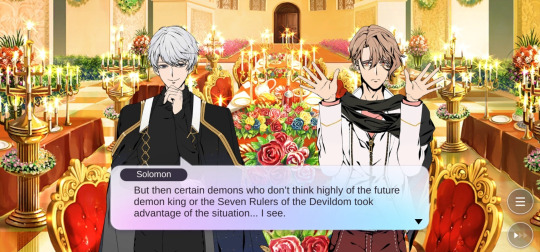

We were able to escape with our lives thanks to some clever thinking by Belphie, and after reuniting with the entire cast it seems we can all just go and have some fun.
Right?
We're then given the choice between shopping, the theme park, or the casino. Each scenario puts you with different characters, but they all include a similar situation -- a random demon showing up to attack.



In all three scenarios, MC is fortunately able to quickly use their magic to stop the demon. Notably, if you choose shopping, Solomon hones in on the fact that we were able to do it without having to recite an incantation. The demon then gives up and disappears, and we resume doing our fun activities like nothing ever happened.
It's only when MC brings it up the next day that anything gets addressed -- but it's just focused on MC's magic. They note that MC's power is getting stronger, making them susceptible to magic sickness and the potential to lose control. Solomon says he'll be mindful of that in his trainings with you, and tells everyone that they need to keep MC's growing magical power in mind.

You know what we don't talk about though?
The actual attacks!
Sure, the demons were quickly taken care of by MC's attack spell, but you would think there would be a bit more conversation around the fact that our cast was attacked multiple times by hostile demons! And in all three cases of the latter attack, the mystery demon specifically calls out their relationship with "the future Demon King" as the reason for targeting them. Will we see that get addressed in later lessons? The naming of "Demon A" does seem to imply the existence of a "Demon B", "Demon C", etc...so maybe! But given OM's track record, we also wouldn't count on it.
Over the course of OM's story, it's been reiterated that Diavolo's RAD Exchange Program is not heavily favored. Some demons at RAD have slowly come around as they've gotten to know the exchange students, but he is still fighting a constant uphill battle as he tries to forge peace among the Three Realms -- and these recent lessons show that there are still some demons who are ready to take more drastic actions to bring it all to a halt.
#obey me#obey me!#obey me swd#obey me shall we date#omswd#obey me nightbringer#obey me nb#omnb#obey me nightbringer spoilers#obey me diavolo#obey me devildom#obey me analysis#obey me nb lesson 51#obey me nb lesson 52
80 notes
·
View notes
Text
the promised Ryulock/Homumiko essay
So a few days ago, I made this post as a joke about the fact that there's just as much evidence for Ryulock as there is for Homumiko and left it on "In this essay, I will" because I thought it would be funny. I have decided to follow up on that joking comment because I feel like it (but also I'm with everyone who questions how/why Ryulock isn't more popular, you have two games' worth of content. I also mentioned at some point that I wanted to analyze the similarities between Sholmes's dynamic with Ryunosuke and his dynamic with Mikotoba). So, here's a Ryulock and Homumiko essay. Spoilers for both The Great Ace Attorney: Adventures and The Great Ace Attorney 2: Resolve will be present here, you have been warned.
Part 1: Ryunosuke's Role in Sholmes's Life
From their first meeting in The Adventure of the Unbreakable Speckled Band, Ryunosuke has fulfilled a specific role in Sholmes's life. The role of John H. Watson. This isn't as obvious as Mikotoba's dynamic with Sholmes (in fact, I never really acknowledged that Ryunosuke was fulfilling the role of Waston until after I finished the duology, and posted about Sholmes and Mikotoba's dynamic reminding me of Sherlock Holmes and John Watson), but it's still notable enough that The Watson is a trope under Ryunosuke's tropes on the TVTropes page for The Great Ace Attorney's main cast.
We can go even further and compare the third Dance of Deduction in The Adventure of the Unbreakable Speckled Band to the last Dance of Deduction in the duology (the former involving Ryu and Sholmes and the latter involving Sholmes and Mikotoba). In both, Sholmes is taking the situation seriously; he just found out that Kazuma was Ryunosuke's best friend in Speckled Band and so wanted to find the truth about what happened so Ryunosuke couldn't be incriminated anymore, and he was on a time crunch to find Jigoku in The Resolve of Ryunosuke Naruhodo because Jigoku was on his way out of Europe. Both have Sholmes taking the deduction incredibly seriously compared to his other deductions, and they involve Ryunosuke and Mikotoba essentially filling in the blanks for Sholmes, instead of correcting him like the other deductions in the duology.
Ryunouke keeps this role throughout the rest of the duology. Sholmes shows up at the scene of a crime Ryu's client is accused of, they investigate the crime together and do a dance of deduction, and they figure out what happened; this usually (always) seems unrelated to the case, before it gets revealed that it is related to the case. The primary difference between Sholmes's dynamic with Miktoba and his dynamic with Ryunosuke here is that Sholmes's dances of deduction always benefit Ryunosuke in more ways than one, and they're usually important to his case. Basically, Ryunosuke being a lawyer slightly changes his dynamic with Sholmes, because one of the purposes of Ryu and Sholmes's dances of deduction is for Ryu to develop his abductive reasoning skills, which helps him in court.
Ryunosuke and Mikotoba effectively serve the same role in Sholmes's life (that being, they're both his investigative partners at different points in time) but they have different benefits from doing so.
Part 2: Sherlock Holmes and John Watson Dynamics Are Always Gay
This is one of the most iconic parts of Sherlock Holmes. To be clear, I haven't read the original Sherlock Holmes stories. However, I am 100% comfortable saying that, based on the excerpts I have read, Watson and Sholmes have one of the most homoerotic dynamics in fiction. This always carries over into adaptations, and The Great Ace Attorney is no exception with Mikotoba or Ryunosuke (although I would argue that the dynamics are still a little different).
On Mikotoba's end, it's both confirmed in official art and implied in dialogue that between Mikotoba helping deliver Iris and him going back to Japan, Mikotoba and Sholmes were raising Iris together, and he says that he left Iris with Sholmes because he couldn't take her back to Japan. This can be read a few ways, but I thought it was worth mentioning here.
Outside of what's mentioned/referenced, we also have what is seen in real time in the last two cases of Resolve. Sholmes and Mikotoba have kept in contact via telegram for a decade, Sholmes tells Mikotoba that the sight of him is "making his mouth water" (which I'm convinced is a reference to Ryunosuke saying "So you'd eat your friends. I'll remember that." but it also definitely comes off as very gay). Mikotoba also refers to 221B as "our home", referring to himself and Sholmes. I also think it's notable that Mikotoba regains consciousness and is immediately dragged off by Sholmes to do an investigation.
On Ryunosuke's end, dear god there's a lot (to be clear, there's more on Ryunosuke's end because he spends more time with Sholmes on-screen than Mikotoba does, not because one is inherently more canon than the other or anything). Let's go through a non-comprehensive list (because I'm thinking of most of these off the top of my head), in no particular order:
Sholmes claims Ryunosuke not being in handcuffs throws the balance off, because he'll always imagine Ryunosuke with handcuffs (The Adventure of the Unbreakable Speckled Band)
Susato teases Ryunosuke about being excited to dance around with Sholmes during the first dance of deduction, and Ryunosuke looks happy with himself from the beginning of the first dance of deduction (The Adventure of the Unbreakable Speckled Band)
Ryunosuke seems only slightly less excited to be seeing Sholmes again than Susato (The Adventure of the Clouded Kokoro)
This entire conversation that is implied to have happened right after Ryunosuke got out of bed and downstairs (The Memoirs of the Clouded Kokoro)
Sholmes putting all his weight on Ryunosuke in that commemorative photograph that was taken before Susato left England (first shows up in The Adventure of the Unspeakable Story, shows up on Ryunosuke's shelf later)
Sholmes putting his hands on Ryunosuke's neck because "Blood loss has made my hands cold, Mr. Naruhodo! Have a feel!" (The Adventure of the Unspeakable Story)
Ryunosuke calling Sholmes in drag "stunning" (The Adventure of the Unspeakable Story)
Sholmes referring to Ryunosuke as "something of a manservant around here" because he hasn't been doing much other than helping around the flat since being disbarred (The Return of the Great Departed Soul)
Ryunosuke referring to Sholmes being knocked out during a dance of deduction as Sholmes "leaving him alone on the ballroom floor" (Twisted Karma and his Last Bow)
And that's not even all of it, I can guarantee it. Those are just the ones I remember best because they stand out to me. Sholmes's dynamic with both Mikotoba and Ryunosuke are incredibly gay.
Part 3: Sholmes's Relationship to Dances of Deduction
This is an interesting topic to cover, and this topic is going to be more an analysis of Sholmes than statement of canon fact. We know Sholmes is perfectly adept at accurate deductions, and it's indicated as early as The Adventure of the Unbreakable Speckled Band that he's purposely making bad deductions. We see how his deductions usually work when he's not goofing off in The Unbreakable Speckled Band, in fact. So that then begs the question, why is he so adamant about pretending to be bad at deduction, even when Ryu proves his own ability to make accurate deductions? Sure, helping Sholmes allows him to practice those abilities, but the more serious dances of deduction where Sholmes's "dance" partner is filling in the blanks would serve the same purpose, and it's something literally anyone could do.
I'd also like to clarify something here: Susato doesn't get directly involved in a dance of deduction until Sholmes is unavailable, and even then Ryunosuke treats it like a solo act (specifically stating "He's left me alone on the ballroom floor, so I'm going to have to do this next part solo"). Susato assists Ryunosuke during dances of deduction, sure, but her involvement doesn't go beyond that with the exception of when Sholmes gets knocked unconscious.
So back to the question at hand, why does Sholmes do dances of deduction seemingly exclusively with Ryu and Mikotoba? I don't think it's a coincidence. I do think it's because dances of deduction aren't platonic for him. Sholmes and Ryunosuke's especially come off as a couple's dance to me, although part of it does come from Ryunosuke indirectly comparing it to a ballroom dance, the most popular of which for pairs in the Victorian era was the waltz (which is traditionally a couple's dance). So I do think that, for Sholmes and very probably Ryu at the very least, dances of deduction are either romantic, erotic, or both.
This leads back around to the original question. I've already established that Sholmes's dynamics with Ryunosuke and Mikotoba are both incredibly gay. I also just established that Ryunosuke indirectly compares dances of deduction to a ballroom dance, in this case a waltz. Dances of deduction are always a partnered thing, and Sholmes is only ever seen doing them with Mikotoba and Ryunosuke. I don't think it'd be a stretch to claim that Sholmes makes them gay on purpose. For what purpose you ask? Male companionship, obviously.
I'm kidding about that but I do think Sholmes does it to have another companion that isn't Iris, at least in Ryunosuke's case. In Mikotoba's case, it likely came from wanting companionship at all. We know Sholmes is an attention whore, and I feel like being as important a part of someone's life as he was to Mikotoba while Mikotoba was studying in England strooked that a bit. I also wouldn't be surprised if Ryu reminded Sholmes of Mikotoba on some level (both are Japanese students studying in Britain for the time Sholmes lives with them).
Part 4: Conclusion (AKA I'm tired so I'm stopping myself before I pass out on my keyboard)
In conclusion, there are so many similarities between the Ryulock and Homumiko dynamics that I feel go unacknowledged. It is not a coincidence that Sholmes's dynamics with these two specifically is so fucking gay. Like I don't know if it's just me but playing as Mikotoba in the last dance of deduction didn't feel much different than playing as Ryunosuke, besides slight differences in dynamics because Mikotoba's known Sholmes longer than Ryunosuke has. Aside from that detail, if Mikotoba hadn't been clearly who Sholmes was with, I would've absolutely thought he was with Ryunosuke. Sholmes has a type and that type is quirky guys who are fun to tease.
#ace attorney#the great ace attorney#herlock sholmes#ryunosuke naruhodo#yujin mikotoba#tgaa2 spoilers#ryulock#homumiko#character analysis#ace attorney analysis#i spent well over an hour typing this up. its almost 1800 words. i did not think i had that much to say about ryulock/homumiko parallels#also as mentioned i am SO tired. so sorry if parts of this dont make sense lol
54 notes
·
View notes
Text
Set in sand - Chapter 9
We mark the year 1934 and a peculiar journal falls into your hands. It's telling the tale of an outlaw and the downfall of a gang. Some pages are torn and others are downright unreadable, but nevertheless, you are still able to make out some parts of the tragic story.
With the help of a certain time traveler friend of yours, will you be able to safe the author of the journal or will you be the cause for his demise?
Previous chapter
Next chapter
Word count: 4347
TW: end-game spoilers will be mentioned very early on in the story, 18+ MDNI, sexual themes, violence, gore, death, misogynistic themes (anything that happens in the game as well), she/her pronouns

"You good to go?", Arthur asks as he approaches the table you're sitting at.
A smile begins to spread on your face and you stand up from your chair. "Of course."
It's almost noon and the sun is burning into your neck, but you barely feel it. Today you will finally go out with Arthur again and you're convinced that nothing is going to be able to dampen your excitement.
He extends his hand to help you get atop of his horse after he hoists himself onto the saddle himself.
"Got your gun with you?", he asks and even though you know that it never leaves your pocket, your hand still moves to your side to check it.
"Yup."
Arthur nods. "Keep it tucked away. I don't want folk to get the wrong idea."
That sounds reasonable. He's made it clear yesterday that this won't be a job where you'd have to resort to violence. It's a relief, really. Yes, you're starting to feel more comfortable with the thought of firing your revolver, but it doesn't mean you're particularly enjoying it.
"So what's the plan?" You remember him telling you that he would come up with one this morning.
There is a hope in you that he might have possibly changed his mind about playing a bit of dress-up and pretending, but you know that the chances aren't good.
"We'll just say that we're lookin' to learn more about the rich history of this land 'round here.", he answers and you try your best to mask your disappointment.
"Alright.", you answer and he throws you a quick look over his shoulder before focusing on the road again.
"You sound disappointment.", he comments and you bite back a sigh.
Disappointed doesn't even remotely come close to what you're feeling right now. Crushed would be more appropriate (and more dramatic). "No, I'm fine."
Even though you sound anything but fine he still doesn't question you any further. Perhaps it's to respect boundaries or perhaps he doesn't want to get deeper into the whole dress-up topic. It's probably the latter of those two.
That's when you notice that the Gray residency isn't too far away from camp. In fact it doesn't even take 15 minutes until you arrive and Arthur slows down into a trot.
As you come closer to what seems to be the main house, two guards at the front stop you. Both of them are heavily armed with rifles and grip them a tad tighter when their eyes fall on you.
"What do you want?", the one on the right asks and takes a couple steps closer.
He sizes you two up through narrowed eyes and with a suspicious glare. What a warm welcome.
"My wife and I are history enthusiasts and would like to learn more about this land. We've been told-" Before Arthur can even finish his sentence, the guard who had stepped closer raises his hand in an irritated manner.
"I've heard enough. You'd like to talk to Master Beau regardin' that.", he answers and walks back to his post. "He's near the stables on the left."
Arthur thanks the man and together you start going into the direction he has pointed towards.
"My wife and I are history enthusiasts.", you repeat, dropping your voice to sound lower and imitating Arthur's deep southern drawl. "We're so interested in in history."
"Real funny.", he answers, dragging out the first word and with his tone oozing with sarcasm.
Then you spot a young man leaning against the wall, completely engrossed in his book. Arthur and you get off the Tennessee Walker and make your way towards the man.
"I see you at the Sheriff's office?", the outlaw calls out and the young man's head snaps up. You give Arthur a quick puzzled look. Whatever happened to the history enthusiasts you were pretending to be?
"Excuse me, friend.", the young man answers and puts his book down on one of the crates.
Arthur takes his usual stance where he places his hands on his weapon belt and eyes the young man thoroughly. "We friends?"
The energy he's giving off now is a vast contrast to earlier when he talked to the guards. There he was almost trying to appear small, but that facade is off now.
You assume that it would be smart to match his sudden change of mannerism and so you straighten your back and keep your chin high. Does it look convincing and threatening? Ah, it seems as if the young man hasn't quite noticed you just yet so it doesn't really matter.
"Not yet, but here's hoping.", he tells Arthur and curls his lips up into a smile. "We don't get a lot of traveling men here. Then suddenly there's a whole phalanx of mysterious, but strangely helpful Yankees about the place."
His wording makes you raise both eyebrows slightly. It doesn't sound like how the rest of his family talks or how anyone else in this area talks, for that matter.
Arthur scratches his cheek. "Is there?", he responds in a casual way.
"What are you doing here?" The question isn't accompanied by a wary or alerted tone, but more genuine curiosity.
Lately it's been a rare sight to meet someone who doesn't immediately assume the worst about you and you're starting to like the man for that.
Arthur looks back at you for a brief moment before answering. "We're just lookin' for work."
For the first time since you've arrived here the man's eyes fall on you and he gives you a friendly nod. "Well, lookin' for something. Don't worry, your secret's safe with me."
"What secret?", you chime in and thankfully manage to hide the concern in your voice. Does that means he knows who you guys truly are?
But the young man completely ignores your question and his entire face lights up instantly. "I've got a secret of my own."
"Are you secretly normal?", Arthur asks bluntly, earning a snort from you. You catch him attempting to hide his half smirk with his cowboy hat by looking down.
"The thing is, I don't care if you kill the whole lot of us and the Braithwaites."
"We don't want to kill anyone.", you assure the man even though he doesn't look worried at all. It doesn't feel like he needs to be reassured, but you still don't want to leave it unsaid.
"I love her, you know?"
"Love who?", Arthur asks rather aggravated.
Though you do have to agree that it's quite difficult to follow this conversation with the way the young Gray jumps from one topic to another like it's a skipping rope.
"Penelope.", he answers in a dreamy way as if he just told you the meaning of life. "But it's impossible."
Of course. A Romeo and Juliet themed love story was bound to happen with the way these two families hate each other. It's almost mandatory for every blood feud.
"She's a Braithwaite.", he continues on. "I'm Beau Gray, son of Tavish Gray, nephew of Leigh Gray the sheriff, grandson of old Murdo Gray."
It's not anything you were aiming for, but now you know the whole goddamn family tree. Arthur seems to share the same thought by the look he's giving you.
Your eyes follow Beau as he paces around like a caged tiger. Obviously the entire situation is making him more than frustrated and you understand.
"We Grays have been loyal to the state and murderers to the Braithwaites for so long now, no one can even quite explain why! Beyond blind loyalty and stupidity. I'm supposed to be loyal to some nonsense while she-"
The young Gray stops mid sentence and let's out a soft sigh. He tells you more about this Braithwaite, Penelope, calling her a woman of the future and praising her in high tones. It earns a gentle smile from you.
How refreshing it is to see that at least some of the younger generation don't see the point of continuing this senseless hatred and fighting.
"Well, I'm sorry for your predicament.", Arthur says and turns to leave, but Beau extends both hands in his direction.
"Would you help?" His voice is laced with desperation and he watches you two with pleading eyes.
"We don't wanna get involved in gang feuds. It seems unseemly", the outlaw answers on your behalf and you shoot him a rather offended look. You would like to hear what the young man has to say, but you understand that you also have to keep a low profile here.
Beau's response comes shooting out of him like a bullet. "I'll pay! I've got money! We Grays we've always got money. No brains, mind, but money."
Arthur and you change looks for a brief moment.
It's worth hearing him out now.
Judging by the expression on his face he seems to be thinking the exact same thing. Well, you haven't quite been as opposed to helping as the rugged outlaw has.
"In that case..."
The words don't even leave Arthur's mouth completely and Beau already jumps to hand him a letter and a small gift box. He explains how Penelope usually sits in a gazebo at the edge of the Braithwaite property.
Together you make your way back onto the horse and ride towards where the other family resides.
"Now we're caught up in this hillbilly version of Romeo and Juliet.", Arthur mutters under his breath, sounding more than a little frustrated.
It makes you chuckle. "I think it's cute."
"Good for you then. I for one don't like bein' some errand boy."
"Oh, don't think about it like that, Arthur. We're not just running some errands. We're helping a young couple in the name of love.", you respond with an amused smirk on your face and he shakes his head.
"I'd rather do it in the name of money like he promised us."
True. You can't imagine Arthur saying yes to this without the outcome involving a payment of some sort. That's not the case with you though. You're actually kind of excited to see where this goes.
"He said the guards aren't too friendly to strangers so I'll sneak in.", Arthur says as he stops outside the Braithwaite property and jumps off his horse.
"I can come with you.", you answer, but he raises his hand and shakes his head.
"Absolutely not. You'll wait here for me and at the first sign of trouble, I want you to run away."
The fact that he doesn't trust you with these things still frustrates and offends you. After what you've done to these two O'Driscolls you thought he wouldn't doubt you this much still.
It's futile to argue about it though and you know it so you silently watch Arthur jump over the white fence and vanish in the tobacco fields.
Yes, he told you to flee when something happens, but you're convinced that he's got this in the bag. Arthur might not be the sneakiest member in the gang, but he's a good enough hunter to stay undetected by humans.
Besides, if he actually would get into trouble and you'd get wind of it, you're convinced that you couldn't leave him. Knowing you, you'd most likely run head first into the fight.
As you're leaning with your back against a tree and playing with a flower you have picked from the ground, your mind starts to wander.
This is another fantastic opportunities to travel back home, but you're playing around again.
You shake your head in an attempt to get rid of these thoughts. There's no way you can just disappear in the middle of a job. Especially during one where you're with Arthur.
Excuses.
Much to your relief and luck, the rugged outlaw returns again before you could even begin to spiral once more. Quickly you notice that he has an even more annoyed expression on his face than he did after talking to Beau.
"Did it not go well?", you ask, concern thick in your voice.
"No, I met her and we talked, but she gave me another goddamn letter.", he answers through gritted teeth. "Come on. I want this to be over as soon as possible."
As you climb back onto his Tennessee Walker, you bite back a chuckle and overall remain silent during the ride. Yes, you could tease him relentlessly, but you decide to leave the man alone. For now.
You definitely won't show this much mercy once you get back in camp. Just imagining Sadie's face and laughter when you tell her about all this makes you grin to the point where your cheeks hurt.
When you arrive back at Beau's, he's in one of the stables and taking care of the horses. Arthur and you get off his and he leisurely strolls over the gate and leans against it with both arms.
"You got our money?"
Beau's arm shoots forward to place some dollar bills in Arthur's hand and he gives him a yearning look. "Did she send anything back."
"Yes.", the outlaw answers and the young man goes to push open the gate, but Arthur stops him. "But it'll cost ya."
The man's face falls and you give Arthur a stunned look. His eyes flicker towards you, noticing your disapproval and he let's out a defeated sigh before stepping away from the gate.
"Fine.", he grumbles into his beard and hands over Penelope's letter.
Beau's eyes fly over the words and his expression turns more mortified by the second. "This'll get her killed for sure."
This piques your interest and you turn to face him. "What is it?"
"Women's suffrage. 'Round here they don't even like men voting. They'd bring back the monarchy if given the chance. Progress is a dirty word in these parts unlike incest."
The last part now even has Arthur's attention and he furrows his eyebrows. "Excuse me?"
"I don't wanna marry my cousin, Mathilda! I wanna marry Penelope, but they'll- they'll kill her at one of these rallies they're holdin'! They've done it before!"
Beau paces around, clearly upset at the situation and then he turns around on his heels to give you both another one of his pleading looks. "You gotta help!"
Before you can even open your mouth to answer, Arthur beats you to it. "No, we don't want no part of it."
"I'll pay! My family, we've still got some money!", Beau argues.
This time it's you who doesn't let the other speak up. Whether it's out of offense for being interrupted or because you feel the strong urge to help this man, you can't tell. "We'll do it."
Your gaze is set on Beau, completely avoiding whatever venom Arthur might be shooting at you through his blue eyes. Later when you two get back to camp, you'll probably get an earful for this, but right now you couldn't care less.
"Thank you! I knew you and your wife would understand!", Beau yells out and before any of you could correct him he's already on a horse. "Come on!"
The prospect of possibly joining the rally makes you excited. It dampens the thought that it could end in violence with the way Beau described the people around Rhodes.
In the distance you spot a large wagon and a group of women gathered next to it. They're all wearing a banner in which the vehicle itself is decorated with as well.
Beau practically flies off his horse the moment you all get there and you follow him on foot towards a young blonde woman. Her face both lights up and darkens when her eyes fall on the young Gray.
"Beau, what are you doing here?", she asks in disbelief and grabs both his hands with hers.
"Stopping you! You'll get yourself killed." His voice is laced with fear and desperation and upon hearing his words, she pulls away.
Her chin is set high as she steps back with a determined look on her face. "I'm prepared to die for the cause."
It sends a shiver down your spine and you feel something within you stir. If there was even a little bit of doubt inside you, then it had left for good. Now you're more than certain that you want to, no have to join this rally.
"You have to do something!", you hear Beau plead and Arthur let's out a grunt.
"Do what? Fight this mob? They'd eat me alive."
Without an ounce of hesitation you tap the blonde woman, who you assume is Penelope, on the shoulder and she faces you. "Arthur can drive the wagon. We'll join you."
"Excuse me?", you hear the outlaw call out to you and Penelope hastily walks towards the older woman who's giving a speech at the other end of the group.
Arthur places a firm hand on your shoulder makes you turn around towards him and opens his mouth for what you think is a scolding, but nothing leaves his lips when you two lock eyes.
None of you speak a single word, but at the same time it feels like plenty is being said. The anger in his face slowly fades away and so does his grip on your shoulder.
"You said you'd drive the wagon?" The older woman who was giving a speech up until now steps next to you.
Without his eyes ever leaving yours he answers. "Yes."
"Wonderful! Olive Calhoon.", she says and shakes his hand. "Normally I like to drive the wagon myself, but today I feel like a man joining us sends just the right message."
Your smile grows ever wider as everyone gets onto the wagon and you climb into the saddle of Arthur's Tennessee Walker. The horse knows you well enough by now to not cause any trouble and buck you off and you give him a soft pat.
As the wagon starts moving and the women begin to sing, you shoot Beau, who's riding beside you, a reassuring smile. He returns it, but it's clear that he's still worried.
"We're mothers, wives, housekeepers, and daughters! We cook the food and we fetch the water! Sing songs of freedom and glory be! Fair women on the mind, come join with me!"
Voices of women singing fill the air, making the people of Rhodes step out onto the street. They're all staring down the wagon with discontented faces and some of them even yelling, demanding for the rally to stop.
"You're disrupting the peace!", one of the bystanders calls out angrily, earning loud agreement from the others.
All that protesting doesn't seem to intimidate the women at all or stifle the energy they're putting into this. On the contrary, their voices grow even louder as if they're being cheered on instead.
It feels like electricity is coursing through you at the sight and you begin to join into the song as the wagon drives through the small town.
"They're gonna stop at the bank. Let's leave the horses in the back.", Beau rips you out of your bubble and you blink a few times before nodding. You had totally forgotten about the reason why you're here in the first place.
Without saying another word you follow the young man behind the bank and hastily make your way back to the group. Arthur is standing at the edge and you stop by his side while listening to Miss Calhoon.
"Ladies and Gentlemen! This is a great day for all of us!", she starts and you join in on the cheering.
You feel Arthur's gaze on you, but your eyes and ears are glued to the older woman who is standing at the top of the stairs. The wide smile on your lips never leaving your face.
Unfortunately you spot two nasty looking men in the corner of your eyes, walking straight towards Beau and you carefully watch them like a hawk.
One of them is big with a balding head and a thick mustache. "What the hell you doin' here, boy?"
"Hello, darlin' cousin.", Beau responds with a strained voice while his eyes are fixed on Miss Calhoon. He's doing his best to avoid looking at the men.
"Don't you ever speak to me like that!", mustache man spits as if he's got an insult thrown at him instead of a term of endearment.
The other man is slightly taller than the first one and a vast contrast with his full set of hair on his head. "What are ya doin' here?"
"Listenin', I suppose."
You nudge Arthur's shoulder and motion with your chin towards them. A single look is being exchanged between you, a silent message and together you push through the women to get to the young Gray.
"Weren't we just leavin'?", the outlaw calls out to Beau and you follow closely behind.
"Who are you?", mustache man asks through narrowed eyes.
Arthur gives him a long, stern look, but ignores his question. "Follow me through here.", he tells Beau.
The three of you walk around to the back and the young man tells you about a place where you could go to. It's an old battlefield no one visits anymore and it's apparently a good spot where his cousins won't be following you.
You sincerely hope that he's right with that. After all this you're not particularly in the mood for a fight.
"You know, I ain't voted before, but I'm kinda gettin' hot for votin' rights!", Arthur comments and you can't tell if it's meant as a joke or if he's being serious.
"I don't know if I should take you seriously, Mr. Morgan, but my cousins are my primary concern now. If anyone should know about Penelope and me..."
"Everyone knows about Penelope and you!", the outlaw yells and you nod along. "We know about Penelope and you and we been here all of ten minutes."
He's right. Beau might keep saying how important it is to keep his love a secret, but the signs really don't look too good if he tells every stranger he meets about it. Goddammit, he told Arthur and you about it before you could even grasp the chance to introduce yourselves after all.
Beau continues telling you once again how much his family hates the Braithwaites and that it's not any different the other way around. He even mentions a Catherine Braithwaite and her daughter, but Arthur shuts him down quickly.
"I ain't heard 'bout daughters. Only treasure.", he says and your small group stop by the spot Beau was mentioning earlier.
You get off the horses and the young mean rummages inside the satchels of his saddle.
"You know, you should leave. With Penelope.", you chime in and he let's out a longing sigh.
"I will once I have enough money. You see, my family has a lot of money, but I don't."
Arthur crosses his arms infront of his chest and chews on the inside of his cheek. "Is your family very rich?"
You almost cough at the bluntness of his question, but manage to compose yourself in time. This is the whole reason why you're here after all. To find out if these families really are sitting on a pile of money or if it's all just some horseshit.
"Yes I believe so, but they keep me out of the discussion.", Beau answers. "I have more of an artistic temperament so..."
"Is that what they call it?", the outlaw comments while looking away into the distance. You bite back a laugh.
Beau walks around his horse, handing a bundle of dollar bills to the outlaw. "I really love her. I do."
"Well, stick around and maybe you can die for her as well.", he answers casually while counting the money.
"I thought you were gonna make me feel better."
You place your hand on the young man's shoulder and give it a reassuring squeeze. "It will all turn out just fine."
Hearing your words makes him smile even though there is nothing backing them up. None of you know if it actually will turn out alright for the two unfortunate lovers, but you'd like to believe that it will.
Arthur's voice rips you out of your thoughts and you pull your hand away. "We gotta go now."
Beau says his farewells to you two and your gaze follows after him as he disappears into the distance.
"Wasn't this kind of nice?", you ask and a scoff leaves his throat.
"Nice? If you think runnin' around deliverin' some letters is nice then sure." He shakes his head in a disappointed manner. "And we still don't know for sure if this treasure everyone keeps talkin' about exists."
He hoists himself up onto his saddle and extends his hand out to you. As you take it, you give it a short squeeze and smile up at him. "Thank you."
Confusion spreads on his rough features and he pulls you up. "For what?"
"Bringing me with you and doing all this. I know you didn't want to join the rally or drive the wagon. I also wanted to apologize for that, you know? I understand that I put you on the spot back there and I'm sorry. It won't happen again."
The horse starts walking in a leisure and comfortable pace and for the longest time you don't get an answer. You begin to fear that he might be angrier than you have initially expected.
"There's no need to apologize. I guess it was fun...in a way.", he mumbles into his beard.
It feels like a burden has been lifted off your shoulders and you sigh in relief. "So you're not mad at me?"
"'Course not."
Instinctively you wrap your arms a but tighter around his waist in a half-hug and it doesn't go unnoticed by you that he's not attempting to get away from your touch or even tensing up from it.
Sure, you didn't find out too much about the Gray family, but today was still a success in your book.

Taglist: @shackspossum
#arthur morgan#arthur morgan x reader#rdr2#rdr2 arthur#rdr2 arthur morgan#rdr2 fanfic#rdr2 x reader#rdr2 arthur morgan x reader
29 notes
·
View notes
Text
SXF MANGA SPOILERS, READ AT YOUR OWN RISK!
Hi! It's me again!
I want to thank all of you wonderful people who have read the first fic I did, The Conversation. I love and appreciate every single one of you! <3
Since that post gained a bit of traction, I decided to write down the prequel, aka how Damian even realised Anya can read minds. (Un)fortunately, this fic got a bit long so I'll be posting the first part for now. I hope you enjoy!
The Revelation - part 1
Damian was sitting on his bed in the dorms, his legs crossed. He had spent almost the entire day studying in the library, his nose in the books until Ewen and Emile dragged him out. After forcing Damian into the dorm, the boys went to get something to eat. Since Damian wasn't hungry, he chose to go to their room instead and have some well deserved rest. However, once he snuggled into his bed, he couldn't fall asleep.
Damian had been struggling with insomnia for a while, and the causes of his lack of sleep were always one of two things. If he wasn't stressing about his academic status, his mind liked to drive him crazy with all the memories he has about that shimp-haired commoner. The latter frustrated Damian to no end. He hated his own mind for toying with his heart in such a manner, for having chosen to give so much of its precious attention to someone so undeserving of it. If he'd paid as much attention to his studies as he did to Forger, he'd have already become an Imperial Scholar. A part of him wished he would come to his senses, but a small part of him hoped it could be like this forever.
So Damian did what he always does when he needs to relax and stop thinking about that girl - he took one of the many "The Serpent's Orb" comics he owns and began rereading it.
"The Serpent's Orb". Oh, how he adored that comic. He started reading it during the Dark Preschool Ages. He would read it whenever the halls of his mansion felt too empty and the rooms too big. Damian cringed thinking about the time he spent reading and reenacting the story to Jeeves. He cringed even harder when he remembered he would sometimes tell the same story to his old plushie whenever he'd be too scared to sleep at night, believing there were monsters in his closet. By the time he moved into the boys' dorm at Eden, he already knew every line in all the volumes, every episode of the show. Damian was ecstatic to hear Ewen and Emile were fans of the show like him, but they were never as enthusiastic about it as he was. He never blamed them for not loving it as much, though. For them it was just another cool show, but for Damian, "The Serpent's Orb" was a lifeline.
He took one of his favorite volumes from underneath his bed and began reading the first page. He usually reads through an entire volume in the matter of minutes, but he found it hard to concentrate during school break. His mind had been too occupied reliving the last time he saw that peanut-obsessed stalker. He did his best to call the night of the gala anything but magical, even if he did spend a good portion of it arguing with her.
Damian rubbed his eyes in hopes of erasing images of Anya dancing with him. He reread the page he stopped on. The main character read the mind of his best friend to find out what happened on the planet he visited. Damian hadn't really found this scene as interesting as many other fighting scenes up until that moment.
Mind reading, huh? - he pondered. It reminded him of the joke that dummy made at the gala. Damian knew better than to believe such an ability exists. This is the real world, not some cartoon or a comic.
I mean, imagine what life would look like if telepathy was real. You would know exactly what the other person thinks. If i could read minds, I'd have perfect grades! I would win every game of Old Maid and excel in every quiz! There's no one I wouldn't beat in every single football match! Bazooka Bill would fear me!
He kept daydreaming, chuckling to himself.
Until it hit him. He felt his stomach sink.
Didn't Anya make Bill cry when she dodged his every single throw, as if she knew what he was about to do? Didn't she know about some of the most embarrasing moments in Damian's life, like when Max pushed him into a pond on accident? Wasn't it Anya who won the first round of Old Maid, before she agreed to play another round because it seemed like she cheated? Didn't she somehow find out the bombs around their necks were fake in that damned bus, despite nobody ever hearing any of the terrorists say it?
Damian's mind was racing, going over every single interaction he's ever had with Forger. He stared wide-eyed at the pages in his lap, his face turning paler by the second. He dropped the comic from his hands as they were too shaky to hold it anymore.
In that moment, he was rethinking his entire existence. Is this life real? Is Anya real? Is he real? Is this all just a bad dream or some sort of a fictional simulation? Does he live in an actual cartoon?!
Damian didn't sleep that night. He barely managed to sleep every other night after that, counting the days before the beginning of the second semester.
He had some investigating to do.
And that's it for this one! I heard somewhere Damian imagined he's on a planet in Dragon Ball Z when he was "training" for the dodgeball match, so I took that fun fact and ran with it. That being said, I've never watched the anime or read the manga, I just searched up if it involves any telepathy. It's why I tried to keep it vague. I hope I didn't get anything wrong but let me know if I did!
I'll make a part two that will revolve around Anya finding out he knows.
Let me know what you think! Any feedback is appreciated! And thank you once again for reading my delulu little stories! Love you to the moon and back!
Byeeee <3
#spy x family#spy x family manga spoilers#anya x damian#damian desmond#damianya#anya forger#can you tell who my favourite sxf character is#i like te idea of damian breaking the fourth wall and being meta#like that one time in the manga when he broke grabbed his own speech bubble and stomped it with his foot#i think that's the only time a character did smth like that#not sure tho#it'd be funny if the only chars allowed to be meta were the kids and Franky#Franky's the only adult in sxf that strikes me as the type of guy who thinks life's a simulation lol
50 notes
·
View notes
Text
Thoughts on Veilguard
TLDR: If empty calories were a video game it would be Dragon Age: The Veilguard. The game is a pleasant enough - if generic and unremarkable - action RPG that basically abandons the themes and feel of the previous games, resulting in a bland story that largely avoids dealing with anything that might remotely cause conflict in the party or force the player to consider anything other than surface level good-bad morality.
If this is the direction they're taking DA, then I think I'm done with the franchise. If I wanted a generic, thematically uninteresting, action RPG there are so many other games to play.
Spoilers in my detailed thoughts below
The good:
It looks very nice - I wish I could have spent even more time exploring the world areas.
Very few bugs or technical issues unlike Andromeda (or most new games in general). I had a few minor issues near the end but overall was very impressed.
Manfred and Assan are great secondary companions. If anyone knows where to find a skeleton and/or griffon friend please let me know.
I quite like Emmerich, Davrin and Bellara and romanced the latter two and (Generally) really liked both. Disclaimer: I tend to have different tastes than the majority of DA fandom when it comes to romances. I expected to have mixed feelings on Bellara because of my issues with Bioware and their cutesy awkward naive/inexperienced female characters but I thought they (mostly) got her right.
Some interesting lore stuff, though I quibble with how it was delivered at times. Still was fun to get a lot more info on the Evanuris, Solas, Mythal, the Titans, etc. And there's also some fun lore stuff in the codices, although again I question whether that's the best way to deliver them.
The final mission is a lot of fun and the clear standout quest other than Weisshaupt maybe. Both are a lot of fun and combine multiple story elements with good gameplay for a satisfying experience.
Combat is engaging although it does get repetitive once you "solve" it. I did a lot of grinding to complete content though so that might be my fault.
Solas is very Solas-y in the game and the highlight of the antagonists by far. I wish there had been more of him and I say that as someone who finds the Solas fandom somewhat exhausting at times. He was far more interesting and compelling than the "even-worse" gods and the fact he's a fuck up who keeps making things worse because he's an egotistical fuck-up who thinks he's the only one that can fix things was is both tragic and fun.
Neve-Lucanis and Taash-Harding are both very cute. I actually think they might be my favorite companion romances off the top of my head (Tali-Garrus does absolutely nothing for me, and I don't even romance either character with my Shepard).
The not good
Why is the Inquisitor wearing pajamas.
Bioware can fuck off for making me pop about a zillion blight pimples. It's really not that much fun after the first 1000
Extremely disappointed with how sanitized the narrative is. There's little attention paid to major facets of the DA universe that are directly relevant to the plot (religion, Tevinter slavery, racism toward elves etc.) and you also get stuff like the Crows now being far lighter of an organization than they were previously.
Just as an example - both Davrin and Bellara touch on what it means to have their gods be the villains but they're just topics for conversation and there's no meaningful impact (especially as the bad guys rely on Antaam and Venatori forces - oh and generic mercenaries). The Dalish are just there (or victims of the bad guys) for the most part. I've read comments from Bioware that confirm this but it seemed obvious Bioware wrote themselves into a corner with making Elven gods be the main antagonists, as you then run into the issue of having the elves not only already be a persecuted minority but also be worshipping evil gods - but instead of writing around it they just avoided dealing with it and acted like it's just the Dalish getting a big win by not joining them.
Speaking of enemies, lots of bland dialogue from the non-Solas big bads. And the Venatori/Antaam/mercenaries gave off major "Cerberus in ME3" vibes - nameless, faceless goons thrown at you in waves that got very boring very quickly.
The way a companion gets hardened because of a choice early in the game is mostly meaningless unless you wanted to romance them. People getting mad about that happening are being ridiculous - if anything the game is too afraid (as usual) to have it actual matter beyond them briefly being upset before moving on.
One of the big choices is to decide whether to protect Treviso or Minrathous when both are attacked by dragons, but it happens so early you might lock yourself out of quests without realizing it. Worse, the ensuing mission is incredibly short and boring (basically a couple of packs of generic enemies and then a very brief dragon fight)
Why is the Inqusitor wearing pajamas.
Why can't I be a mean/"bad" Rook? Even the jokey responses feel super tame compared to previous DAs (let alone the borderline assholish purple hawke). Basically you're only allowed to be slightly different variations of a heroic figure.
While the companions are all nice they all top out at "I like them", with none matching the story or emotional peaks of previous Bioware games. Emmerich comes closest (especially if you account for Manfred) but there's just enough meat to him.
Disappointing romances compared to previous Bioware games(especially but not limited to Lucanis.). Not a ton of depth dialogue wise and at times it feels like they put more time into the companion romance than the Rook version (this time I am definitely talking about Lucanis).
Speaking of which, Lucanis was the biggest disappointment of the companions. I didn't want a Zevran clone but you have a hardened assassin possessed by a demon who (if you choose not to save Treviso, which cuts off a lot of his content) just drinks coffee and likes Neve and uh....
Completely forgettable soundtrack which is a major bummer after previous installments. Also, while I didn't have many technical issues, the music not always playing was one of them (although maybe it doesn't really matter given the lack of quality!)
Bad to horrendous incorporation of previous DA story which was also incongruous with the general tone, especially with the handling of the Inquisitor and the treatment of southern Thedas (especially if you get the Emmerich and Harding picnic conversation at an awkward time like I did.)
Lots of disappointing cameos but especially from my Pirate Queen/Wife from DA2. Isabela's hat is indeed very nice but what is that outfit? And I get they didn't want to deal with too complex a world state but man was it a bummer to see her basically reset after everything her and Hawke went through in my main DA2 playthrough.
Why is the Inquisitor wearing pajamas.
What did they do with Harding? Why did she basically get Dagna's story, even if Titan lore is interesting? She's such a nothing character in this game which is such a weird choice given that she's clearly there because they know fans like her.
The "Actually Varric was dead all along" did nothing for me. He barely shows up in game anyway and the weird framing of every appearance and the fact no one other than Rook ever interacts with him gave it away (at least partially)
40 notes
·
View notes
Text
General Thoughts on Buried Secrets (Hello Neighbor)
Not sure if I'd classify this as a rant post or not. Spoilers ahead, obviously.
If some of my points don't make sense, we can discuss it in the comments. It's 1AM by the time I'm writing this post, so forgive me if the text feels all slammered and not cohesive.
Took me a decade to finish it, but the secrets were unburied (like Jay would say).
And holy crap, I have pretty strong feelings about this book.
Okay, it's not that bad, but comparing to the previous two... it felt flat. I don't know how the explain it in more cohesive terms, but it didn't hit the same way the previous two did.
First, I like the ending. Though it ended on a pretty sad note, this is exactly what the Nicky trilogy (it feels surreal to actually type that) was leading up to.
The very prologue of Missing Pieces is a warning for Nicky to stop wandering, else he'd not make home some day. Nicky's character in general is centered around that: wandering.
"Oh, but what happened after he got kidnapped? What about Nicky's friends? How did he escape?"
Questions like this come from a misunderstanding. The books aren't meant to be your introduction to the lore. They're meant to be an additional piece of information, for those that were curious about the world of Hello Neighbor and wanted to know more about the past.
The true story is told in the games. Make no mistake—Hello Neighbor is a gaming franchise. The story originates from the games.
The ending of Buried Secrets is one-to-one with Act 1 for a reason. You're meant to read these books with the knowledge from the games. So that when you read the trilogy, you went: "Oh, so that's how it happened."
At least, this should be in theory. The sad reality is that games just fucking suck in storytelling and gameplay, to the point where the actual plot is shoved aside for other matters. That's why, in most cases for fans, the books act as an introduction to the story of the games, instead of how it should be in the other way around.
This is why Buried Secrets ends in this cliffhanger way. It's a prequel of the games, but it isn't meant to be an introduction. It's meant to be an additional explanation. You can blame the games' lack of quality for this.
Anyway, I liked the ending because it tied up Nicky's wandering arc in a pretty neat way.
... And that's it. That's literally the only thing that I like about this book. Everything else feels forced just to reach this specific ending.
I'm not sure if Carly was forced to make this a trilogy, but either way this definitely harmed the pacing and plot. Every character is written in a specific way that feels a little unrealistic based on the previous books.
See, Nicky is supposed to break into Peterson's house alone, without the help of his friends. Their method of justifying this is by having literally everyone in town suspecting that Nicky was the one behind the weird activities. No matter how illogical that seems.
My biggest complaint is Maritza.
Like, I won't lie that she isn't reasonable at first glance. Maritza is tired of fighting. She wants to move on. She thinks Nicky is changing for worse because of his obsession with the case. This is all understandable.
The problem is, instead of trying to convince him to move on, she would rather believe he did all of this to frame Peterson specifically? Despite knowing what Theodore's capable of, she'd rather believe that her closest friend would lie to everyone just to convince them of something they were already certain (that Theodore is fucking dangerous)?
I get they tried to apologize to Nicky by the end of the book, but it's too little and too late. Yeah, Peterson framed Nicky in an ill-timing, but would Nicky's only friends believe he'd actually do all of this ALONE?
It just doesn't feel natural.
The beginning and middle part of the book is literally Nicky getting kicked around like an abused puppy and being lonely again. The latter chapters, as well as Jay and Lu, kinda hard carries the entire book. Earthpro is not as interesting as it was in Waking Nightmare. And Buried Secrets tries really hard to get you to hate Trinity and Maritza with the "we are changing clubs" thing.
Overall, I wouldn't say It's a bad book, but definitely the weakest and most surreal among the three.
#hello neighbor#hello neighbor books#buried secrets#missing pieces#waking nightmare#theodore peterson#nicky roth#maritza esposito#rant post#kinda#idk man#it's 1 am#i don't even know what I'm writing
27 notes
·
View notes